Latest topics
Log in
Statistics
We have 15 registered usersThe newest registered user is Keith David
Our users have posted a total of 5723 messages in 2445 subjects
Who is online?
In total there are 11 users online :: 0 Registered, 0 Hidden and 11 Guests None
Most users ever online was 516 on Thu 4 Jun 2015 - 16:29
The Murder of Edgar Allan Poe
Page 1 of 2
Page 1 of 2 • 1, 2 
 The Murder of Edgar Allan Poe
The Murder of Edgar Allan Poe
For 166 years, the death of Edgar Allan Poe remained a mystery, but, now it is time to tell the truth about Poe's murder. Here is an article that I found in the Chicago Tribune, which is dated October 30, 1875. Please note the highlighted text as I will explain, in full detail, the evidence that I have compiled about each item.
EDGAR ALLAN POE.
The Baltimore Monument to the Memory of the Poet.
A Graphic Narrative of His Last Hours --- "Rest, Shore, No More!"
New York Herald.
BALTIMORE, Oct. 27. - For twenty-six years Edgar A. Poe has slept in a nameless grave at the corner of Fayette and Green streets, in this city. A mound, covered with green turf - the velvet he so beautifully describes in some of his prose poems - is all
that marks his resting place; and were it not for the love of a few friends, and the curiosity and admiration of those who have read his works, it would long since have been so confounded with others in its immediate vicinity as to be indistinguishable. Tomorrow,
however, this long neglected duty will be fulfilled by the dedication of a very fine monument.
THE MONUMENT.
The first attempt was made by one of the poet's own family. A handsome headstone was carved out for the green mound in Old Westminster Graveyard, but Fate decreed it should remain without a monument until one worthy of the dust it covered should be chiseled. A
train of cars crashed down the railroad near which the stone was placed, bounced off the track, and shattered it to atoms. At length the public-school teachers, by no means the wealthiest class of this community, weary of the idle protestations of those who were clamorous with
their mouths, but carry with their pockets, determined that this blot upon Baltimore should no longer remain. They formed themselves into an association, and, with the assistance of Mr. George W. Childs, of Philadelphia, succeeded in raising a sum of money sufficient for the construction
of a handsome monument. The project was under consideration for some years. Dr. Thomas D. Baird, the late President of the Baltimore City College, was the originator of the idea; and Prof. William Elliott, who succeeded Dr. Baird at his death, has carried out his plans with great energy and
perseverance. In the spring of 1875 the requisite amount of money having been collected, the construction of the monument was placed in the hands of Mr. Hugh Sisson. Mr. Sisson, mindful of the object for which his services were solicited, has allowed the Committee to go far beyond their original
plan; in other words, he has constructed the whole affair at about cost, allowing his commissions to form his subscription to the general fund. Mr. George A. Frederick, a prominent architect of this city, was the designer; and Mr. Volck, the artist, supplied the model for the medallion of Poe. The monument
is completed. The writer has seen it a number of times. The first impression was one of disappointment. After hearing so much, one is apt to expect something colossal; but this is a plain Grecian pedestal, formed of Italian marble, with a granite base. The base is about a foot high and the pedestal from 7 to 8 feet.
But, like every good thing, it improves upon acquaintance. The means for its completion were limited. Mr. Frederick, having this in view, proposed to make it simple, chaste, and dignified, to strike more by graceful outline than by crowding with unnecessary ornamentation, - like the writings of him it is proposed to commemorate;
and his intention has been faithfully carried out. By degrees its beauty grows upon the spectator, and its diminutive proportions fade from the mind. Only two of the blocks will be used at present; one for the bas-relief of the poet, and the other for a simple inscription recording his name and the dates of his birth and death. Mr.
Henry Steinhausen, the veteran of Mr. Sisson's workshop, to whom the task of making the bas-relief was intrusted, has produced, so the friends of Poe say, the best likeness of the poet extant. We often hear of "speaking marble," but seldom realize its meaning. The beautifully-chiseled features and wavy hair, the melancholy but
refined and intellectual expression, and the deep, rolling eyes of the poet, all are there, and look as though at any moment the tongue might utter,
Never, never more!
Indeed, the marble is a far more faithful likeness than the model, and would reflect credit upon the sculptors of "fair renown."
The monument will be unveiled on Thursday, with imposing ceremonies, in the rear of Westminster Church, where now repose the remains of Poe.
POE'S CLOSING HOURS.
The fourteen closing hours of Edgar A. Poe's life, about which history has been so confused, slanderous, and erroneous, are fully accounted for in the official record of this short but fateful period of the poet's life given below. The narrative is important, not only as the first authentic account of the poet's death which has ever appeared
in print, but as setting at rest the scandalous story that he had been kidnapped by political partisans and plied with liquor until he died in the agonies of mania-a-potu. It seems that he was on his way from Norfolk to Philadelphia to marry "Lenore," his intended second wife, when, as is supposed, he succumbed to an overdose of opium, which
he had taken to allay the excitement of his very sensitive nervous system. Wandering from the hotel at Baltimore to the river-side, he fell asleep on the wharf, was recognized by some friends, and conveyed in a state of stupor to the famous Washington University Hospital, where, fourteen hours afterwards, he died. The record of this closing
period of the poet's life is now preserved to history, finding light for the first time in the columns of the Herald through the following transcript of memoranda which were made by the physician in charge of the hospital at the time the unfortunate man was under his care:
OFFICIAL MEMORANDA OF THE DEATH OF EDGAR A. POE, BY J.J. MORAN, M.D.
Edgar A. Poe was brought in a hack to the Washington University Hospital, situated on Broadway, north of Baltimore street, Baltimore City, on the 7th of October, 1849. He had been found lying upon a bench in front of a large mercantile house on Light-street wharf. He was in a stupor, whether from liquor or opium was not known. A gentleman passing along
the pavement noticed several persons collected about the spot, and, looking in through the crowd, was suddenly impressed with the face, and, on close inspection, recognized the poet. He had been there since early dawn.
A policeman sent for a hack, and directed the hackman to convey him to the above named hospital, which was in my charge, being the resident physician, and living in the dwelling attached thereto. It was about 10 o'clock in the forenoon when he entered the house. He was immediately placed in a private room, carefully undressed, and critically examined. I had not then
any knowledge of his previous condition or what were his habits. There was no smell of liquor upon his person or breath. There was no delirium or tremor. His skin was pallid, with slight nausea at the stomach and a strong disposition to sleep. His condition was more of a stupor. He was sponged with lukewarm water, sinapisms applied to the feet, thighs, and abdomen, and cold
applied to the head.
I had the room darkened, and he was otherwise made as comfortable as he could have been in his own room at home. I placed an experienced nurse at the threshold of his room-door, with orders to watch him closely and prevent the slightest noise from without, and give me notice of any sign of wakefulness or consciousness. In half an hour after I had left him, he threw the cover
from his breast, opened his eyes, and said:
"Where am I?"
The nurse gave me the signal, and I was immediately at his side. I drew a chair close to the bed, took his hand in my own, and with the other smoothed his forehead, pushing back the dark, raven curls that covered it, and asked him how he felt.
He said, "Miserable."
"Do you suffer any pain?"
"No."
"Do you feel sick at the stomach?"
"Yes."
"Are you thirsty?"
"No."
"Does your head suffer - have you pain there?" putting my hand on his head.
"Yes."
"Does it feel heavy or dull?"
"Heavy; mind cloudy," he said.
"How long have you been sick?"
"Can't say."
"Where have you been stopping?"
"In a hotel on Pratt street, opposite the depot." (Eagle Hotel, Pratt Street)
"Have you a trunk or a valise, or anything there which you would like to have with you?"
"Yes, a trunk with my papers and manuscripts."
"If you order it, I will send for it."
He thanked me and said, "Do so at once," remarking, "You are very kind - where am I, Doctor?"
"You are in the care of your friends;" to which he replied, "My best friend would be the man who would blow my brains out with a pistol." (Poe was friendless and alone most of the time. Here he is saying that his "friends" at the hospital are not his friends at all.)
"Try and be quiet, Mr. Poe; we will do all we can to make you comfortable and relieve your distress."
"Oh, wretch that I am! Sir, when I behold my degradation and ruin, what I have suffered and lost, and the sorrow and misery I have brought upon others, I feel that I could sink through this bed into the lower-most abyss below, forsaken by God and man, an outcast from society. O, God! the terrible strait I am in! Is there no ransom for the deathless spirit?"
"Mr. Poe, do try and compose yourself, and take this draught; it will soothe and relieve you."
He reached out his hand to take the glass, the nurse raising his head, while I administered the cordial. He drank it and was laid down, closing his eyes as though going to sleep.
I remained by his side, watching closely every breath, manner of breathing, and trying to make out his case and my diagnosis. I had been impressed that he was suffering from the too free use of alcoholic drink only from what I could gather from those who saw him on the wharf, and did not know how long he had been in this state, but he did not manifest symptoms to justify their suspicions.
He had no tremor, was not fidgety with his hands, or impatient, but answered all my questions calmly and rationally. There was great pallor of face, no injection of the corner of the eye, and pulse sharp and quick. I noticed some twitching of the eyelids while closed, also of the muscles of the face, and slight jerking of the limbs. He remained in this state about one hour, when he again waked up,
suddenly opening his eyes.
I said to him, both to be of service and to ascertain whether he would be inclined to take liquor, for, with intemperate subjects who have delirium tremens, a little of the hair of the dog that bites them often produces a cure:
"Will you take a little toddy?"
He opened wide his large eyes, and fixed them as steadily upon me and with such anguish in them, that I looked from him to the wall beyond the bed.
He said:
"Sir, if its potency would transport me to the Elysian bowers of the undiscovered spirit world, I would not taste it. I would not taste it. Of its horrors who can tell?"
"I must administer an opiate to give you sleep and rest."
Then he rejoined:
"Twin devil and spectre of crazed and doomed mortals of earth and perdition!"
"Mr. Poe, it is very necessary that you should be quiet and free from excitement; you are in a critical condition, and excitement will hasten your death."
"Doctor, I am ill. Is there no hope?"
"The chances are against you."
"How long, oh, how long, before I see my dear Virginia? My dear Lenore! I would like to see my love, my dear love!"
"I will send for any one you wish to see."
I knew nothing of his family, and asked, "Have you a family?"
"No, my wife is dead, my dear Virginia; my mother-in-law lives. Oh, how my heart bleeds for her! Death's dark angel has done his work. I am so rudely dashed upon the storm without compass or helm. Language cannot tell the gushing wave that swells, sways, and sweeps, tempest-like, over me, nailing the 'larum of death. Doctor, write to her mother, Maria Clemm. Tell her her Eddie is here. No, too late!
too late! I must lift the pall over to you the secret that sears the heart, and, dagger-like, pierces the soul. I was to have been married in two days." (Here he stopped to weep.)
"Shall I send for the lady?" I asked, supposing she lived in the city.
"Too late! too late!"
I said, "Oh no; I will send my carriage immediately."
"No, write, write to both. Inform them of my illness and death both at the same time."
"Give me their address."
"Mrs. Shelton, Norfolk, Va., and Maria Clemm, Lowell, Mass."
Noticing the color rising to his face, and the blood vessels filling up on his temples, and the eyes becoming congestive and inclining upward, I asked no more questions, but ordered ice to his head and heat to his extremities, repeating the cordial with an anodyne, and waited with the nurse outside the door for fifteen minutes. No further change, except that his pulse had increased in frequency, and was feeble and dying.
I kept a nurse in his room, and another outside to prevent his being disturbed, and to notify me of any change that might take place.
I had sent for his cousin, Nelson Poe, having learned he was his relative, and a family named Reynolds, who lived in the neighborhood of the hospital. These were the only persons whose names I had heard him mention living in the city. Mr. W.M. Poe came, and the female members of Mr. Reynolds' family. He continued in an unconscious state for more than an hour. On again examining his pulse, I found it very feeble, sharp,
and irregular - 130 to the minute. I proceeded to give him a mixture and a stimulant. He partially aroused while getting the draught, and seemed to stare, the pupils of his eyes dilating and contracting alternately. I sat down by his bedside, took his hand and placed my fingers upon his wrist, and felt assured from all the symptoms, that nature was yielding. I had beef-tea administered, with ammonia. My particular friend, Prof. John C.S.
Monkur - who gave much of his time to the inmates of the hospital, and particularly, when specially called upon, was always ready, and cheerfully attended the summons night or day when within reach - had been sent for two or three times previously, but, being out attending to his general patients, had just returned, and came in at the moment. As soon as he fixed his eyes upon him he said, "Doctor, he's dying."
I replied, "Yes, I fear it is all over."
He carefully examined his case, and, being in possession of all the facts in regard to the agents employed and symptoms presented, - which were carefully noted down in a record book of the hospital, - he gave it as his opinion, which I was fully prepared to corroborate, that Poe's death was caused by excessive nervous excitement from exposure, followed by loss of nervous power. The most appropriate name for his disease is encephalitis.
The doctor advised free use of wine, beef-tea, and gentle cordials, while using ice to the head. The patient raised his hand to his mouth as though he wanted a drink. A small lump of ice was placed upon his tongue. I then gave him a mouthful of water to see whether he could swallow freely. He took it, swallowing with some difficulty; but he drank a wine-glass of beef-tea. He seemed to revive and open his eyes, fixing his gaze upon the transom over
his room-door, - each room having transoms over the door for ventilation and air. He kept them unmoved for more than a minute. He was lying directly opposite the transom. He seemed trying to articulate, but was inaudible. At last he spoke feebly.
"Doctor, it's all over. Write, "Eddie is no more."
"Eddie" was a term used by Mrs. Clemm, his mother-in-law.
"Mr. Poe, permit me to say that you are near your end. Have you any wish or word for friends?"
He said, "Evermore!"
I continued: "Look to your Savior. There is mercy for you and for all mankind. "God is love."
"The arched heavens," he rejoined, "encompass me, and God has His decrees legibly written upon the frontlets of every created human being; and demons incarnate, their goal will be the seething waves of black despair."
"Hope and trust Him."
"Self-murderer, there is a gulf beyond the stream. Where is the buoy, life-boat, ship of fire, sea of brine! Rest, shore, no more!"
His eyes turned upward until the white balls were all that could be seen. Muscular twitching and jerking set in, and with one general tremor all was over.
This occurred about 12 o'clock, midnight, 7th October, 1849.
I had meantime learned from him, and afterward from the porter at the hotel on Pratt street, then Bradshaw's, now called the Maltby House, that he arrived there on the evening of the 5th; was seen to go to the depot to take the cars for Philadelphia, and that the conductor, on going through the cars for tickets, found him lying in the baggage-car insensible. He took him as far as Havre de Grace, where the cars then passed each other, or as far as Wilmington, I forget
which, and placed him in the train coming to Baltimore. He had left his trunk at the hotel in Baltimore. Arriving on the evening train he was not seen by any person about the hotel when he returned to the city. The presumption is, he wandered about during the night, and found a bench some time before morning to sleep upon on Light street wharf, where he was seen and taken from about 9 o'clock the next morning.
A short time before his death I received his trunk from the hotel, as per order, and put it in the care of Mr. Nelson Poe, for his mother-in-law, Mrs. Maria Clemm. I have her letters to me, after his death, thanking me for attention, kindness, etc., to her darling Eddie.
After death, he was washed and carefully laid out, dressed in a suit of black cloth, and placed inside the large rotunds of the college building, where hundreds of friends and admirers came in crowds to pay their last tribute of respect to the deceased. Not less than fifty ladies were each furnished, at their earliest solicitation, with a small lock of his beautiful black hair. His body was kept in the rotunds for one whole day. On the morning of the 9th he was buried in the Westminster
burying-ground, corner of Fayette and Green streets, Baltimore, it being the old family burial-ground of the Poes. A large number of the citizens, many of the most distinguished and prominent literary and professional men, followed the remains to their sepulture. But, of all the crowds of citizens and mourners that wept over the lamented poet, there was one mourner not visible. Yet the depth of her sincerity and grief could not be measured by mortal eyes, and would defy the most skeptical doubt.
I mean his mother-in-law, Mrs. Maria Clemm, who was his aunt as well, he having married his first cousin. I had communicated, as soon as his death occurred, to her the sad intelligence of his fate; to which she replied in strains of the deepest sorrow, and, thanking me for my attention and communication, and in her own language, the letters being in my possession.
"My prayer is that God may bless you for soothing the dying hours of my precious, darling Eddie. Please get Mr. N. Poe to return his last letter to me, for I prize it above rubies. It is a hundred times more precious. He was the most affectionate of sons to me. It was a devotion he had gained and kept until death."
Poe's appearance had not materially changed. His face was calm, and a smile seemed to play around his mouth, and all who saw him exclaimed, "How natural he looks!" There was no discoloration of the skin. He looked to be in a natural sleep.
He was a handsome man, elegantly dressed, and but few could claim advantage over him in this respect. His head was exquisitely modeled, forehead very prominent and largely developed, its measurement corresponding to that of the great Napoleon Bonaparte, a cast of which was in my possession. His skin was fair, hair raven-black and inclined to curl, teeth perfectly good, and eyes gray. His weight was about 144 pounds, and height 5 feet 10 inches. His hands were as delicate as a lady's. His shroud
was made by my wife and a few of her lady-friends, who considered it an honor to contribute in any way to the distinguished poet. A gentleman from Europe, a celebrated physician, was with him a few minutes before his death, and wept over the deceased. He said he considered him the greatest critic and best American poet living. He had read all his works, and sought eagerly for anything relating thereto.
J.J. MORAN, M.D.
Resident Physician for seven years of the Washington University Hospital, Broadway, Baltimore City, Maryland.
Source: The Chicago Tribune: Saturday, October 30, 1875, Page 5
EDGAR ALLAN POE.
The Baltimore Monument to the Memory of the Poet.
A Graphic Narrative of His Last Hours --- "Rest, Shore, No More!"
New York Herald.
BALTIMORE, Oct. 27. - For twenty-six years Edgar A. Poe has slept in a nameless grave at the corner of Fayette and Green streets, in this city. A mound, covered with green turf - the velvet he so beautifully describes in some of his prose poems - is all
that marks his resting place; and were it not for the love of a few friends, and the curiosity and admiration of those who have read his works, it would long since have been so confounded with others in its immediate vicinity as to be indistinguishable. Tomorrow,
however, this long neglected duty will be fulfilled by the dedication of a very fine monument.
THE MONUMENT.
The first attempt was made by one of the poet's own family. A handsome headstone was carved out for the green mound in Old Westminster Graveyard, but Fate decreed it should remain without a monument until one worthy of the dust it covered should be chiseled. A
train of cars crashed down the railroad near which the stone was placed, bounced off the track, and shattered it to atoms. At length the public-school teachers, by no means the wealthiest class of this community, weary of the idle protestations of those who were clamorous with
their mouths, but carry with their pockets, determined that this blot upon Baltimore should no longer remain. They formed themselves into an association, and, with the assistance of Mr. George W. Childs, of Philadelphia, succeeded in raising a sum of money sufficient for the construction
of a handsome monument. The project was under consideration for some years. Dr. Thomas D. Baird, the late President of the Baltimore City College, was the originator of the idea; and Prof. William Elliott, who succeeded Dr. Baird at his death, has carried out his plans with great energy and
perseverance. In the spring of 1875 the requisite amount of money having been collected, the construction of the monument was placed in the hands of Mr. Hugh Sisson. Mr. Sisson, mindful of the object for which his services were solicited, has allowed the Committee to go far beyond their original
plan; in other words, he has constructed the whole affair at about cost, allowing his commissions to form his subscription to the general fund. Mr. George A. Frederick, a prominent architect of this city, was the designer; and Mr. Volck, the artist, supplied the model for the medallion of Poe. The monument
is completed. The writer has seen it a number of times. The first impression was one of disappointment. After hearing so much, one is apt to expect something colossal; but this is a plain Grecian pedestal, formed of Italian marble, with a granite base. The base is about a foot high and the pedestal from 7 to 8 feet.
But, like every good thing, it improves upon acquaintance. The means for its completion were limited. Mr. Frederick, having this in view, proposed to make it simple, chaste, and dignified, to strike more by graceful outline than by crowding with unnecessary ornamentation, - like the writings of him it is proposed to commemorate;
and his intention has been faithfully carried out. By degrees its beauty grows upon the spectator, and its diminutive proportions fade from the mind. Only two of the blocks will be used at present; one for the bas-relief of the poet, and the other for a simple inscription recording his name and the dates of his birth and death. Mr.
Henry Steinhausen, the veteran of Mr. Sisson's workshop, to whom the task of making the bas-relief was intrusted, has produced, so the friends of Poe say, the best likeness of the poet extant. We often hear of "speaking marble," but seldom realize its meaning. The beautifully-chiseled features and wavy hair, the melancholy but
refined and intellectual expression, and the deep, rolling eyes of the poet, all are there, and look as though at any moment the tongue might utter,
Never, never more!
Indeed, the marble is a far more faithful likeness than the model, and would reflect credit upon the sculptors of "fair renown."
The monument will be unveiled on Thursday, with imposing ceremonies, in the rear of Westminster Church, where now repose the remains of Poe.
POE'S CLOSING HOURS.
The fourteen closing hours of Edgar A. Poe's life, about which history has been so confused, slanderous, and erroneous, are fully accounted for in the official record of this short but fateful period of the poet's life given below. The narrative is important, not only as the first authentic account of the poet's death which has ever appeared
in print, but as setting at rest the scandalous story that he had been kidnapped by political partisans and plied with liquor until he died in the agonies of mania-a-potu. It seems that he was on his way from Norfolk to Philadelphia to marry "Lenore," his intended second wife, when, as is supposed, he succumbed to an overdose of opium, which
he had taken to allay the excitement of his very sensitive nervous system. Wandering from the hotel at Baltimore to the river-side, he fell asleep on the wharf, was recognized by some friends, and conveyed in a state of stupor to the famous Washington University Hospital, where, fourteen hours afterwards, he died. The record of this closing
period of the poet's life is now preserved to history, finding light for the first time in the columns of the Herald through the following transcript of memoranda which were made by the physician in charge of the hospital at the time the unfortunate man was under his care:
OFFICIAL MEMORANDA OF THE DEATH OF EDGAR A. POE, BY J.J. MORAN, M.D.
Edgar A. Poe was brought in a hack to the Washington University Hospital, situated on Broadway, north of Baltimore street, Baltimore City, on the 7th of October, 1849. He had been found lying upon a bench in front of a large mercantile house on Light-street wharf. He was in a stupor, whether from liquor or opium was not known. A gentleman passing along
the pavement noticed several persons collected about the spot, and, looking in through the crowd, was suddenly impressed with the face, and, on close inspection, recognized the poet. He had been there since early dawn.
A policeman sent for a hack, and directed the hackman to convey him to the above named hospital, which was in my charge, being the resident physician, and living in the dwelling attached thereto. It was about 10 o'clock in the forenoon when he entered the house. He was immediately placed in a private room, carefully undressed, and critically examined. I had not then
any knowledge of his previous condition or what were his habits. There was no smell of liquor upon his person or breath. There was no delirium or tremor. His skin was pallid, with slight nausea at the stomach and a strong disposition to sleep. His condition was more of a stupor. He was sponged with lukewarm water, sinapisms applied to the feet, thighs, and abdomen, and cold
applied to the head.
I had the room darkened, and he was otherwise made as comfortable as he could have been in his own room at home. I placed an experienced nurse at the threshold of his room-door, with orders to watch him closely and prevent the slightest noise from without, and give me notice of any sign of wakefulness or consciousness. In half an hour after I had left him, he threw the cover
from his breast, opened his eyes, and said:
"Where am I?"
The nurse gave me the signal, and I was immediately at his side. I drew a chair close to the bed, took his hand in my own, and with the other smoothed his forehead, pushing back the dark, raven curls that covered it, and asked him how he felt.
He said, "Miserable."
"Do you suffer any pain?"
"No."
"Do you feel sick at the stomach?"
"Yes."
"Are you thirsty?"
"No."
"Does your head suffer - have you pain there?" putting my hand on his head.
"Yes."
"Does it feel heavy or dull?"
"Heavy; mind cloudy," he said.
"How long have you been sick?"
"Can't say."
"Where have you been stopping?"
"In a hotel on Pratt street, opposite the depot." (Eagle Hotel, Pratt Street)
"Have you a trunk or a valise, or anything there which you would like to have with you?"
"Yes, a trunk with my papers and manuscripts."
"If you order it, I will send for it."
He thanked me and said, "Do so at once," remarking, "You are very kind - where am I, Doctor?"
"You are in the care of your friends;" to which he replied, "My best friend would be the man who would blow my brains out with a pistol." (Poe was friendless and alone most of the time. Here he is saying that his "friends" at the hospital are not his friends at all.)
"Try and be quiet, Mr. Poe; we will do all we can to make you comfortable and relieve your distress."
"Oh, wretch that I am! Sir, when I behold my degradation and ruin, what I have suffered and lost, and the sorrow and misery I have brought upon others, I feel that I could sink through this bed into the lower-most abyss below, forsaken by God and man, an outcast from society. O, God! the terrible strait I am in! Is there no ransom for the deathless spirit?"
"Mr. Poe, do try and compose yourself, and take this draught; it will soothe and relieve you."
He reached out his hand to take the glass, the nurse raising his head, while I administered the cordial. He drank it and was laid down, closing his eyes as though going to sleep.
I remained by his side, watching closely every breath, manner of breathing, and trying to make out his case and my diagnosis. I had been impressed that he was suffering from the too free use of alcoholic drink only from what I could gather from those who saw him on the wharf, and did not know how long he had been in this state, but he did not manifest symptoms to justify their suspicions.
He had no tremor, was not fidgety with his hands, or impatient, but answered all my questions calmly and rationally. There was great pallor of face, no injection of the corner of the eye, and pulse sharp and quick. I noticed some twitching of the eyelids while closed, also of the muscles of the face, and slight jerking of the limbs. He remained in this state about one hour, when he again waked up,
suddenly opening his eyes.
I said to him, both to be of service and to ascertain whether he would be inclined to take liquor, for, with intemperate subjects who have delirium tremens, a little of the hair of the dog that bites them often produces a cure:
"Will you take a little toddy?"
He opened wide his large eyes, and fixed them as steadily upon me and with such anguish in them, that I looked from him to the wall beyond the bed.
He said:
"Sir, if its potency would transport me to the Elysian bowers of the undiscovered spirit world, I would not taste it. I would not taste it. Of its horrors who can tell?"
"I must administer an opiate to give you sleep and rest."
Then he rejoined:
"Twin devil and spectre of crazed and doomed mortals of earth and perdition!"
"Mr. Poe, it is very necessary that you should be quiet and free from excitement; you are in a critical condition, and excitement will hasten your death."
"Doctor, I am ill. Is there no hope?"
"The chances are against you."
"How long, oh, how long, before I see my dear Virginia? My dear Lenore! I would like to see my love, my dear love!"
"I will send for any one you wish to see."
I knew nothing of his family, and asked, "Have you a family?"
"No, my wife is dead, my dear Virginia; my mother-in-law lives. Oh, how my heart bleeds for her! Death's dark angel has done his work. I am so rudely dashed upon the storm without compass or helm. Language cannot tell the gushing wave that swells, sways, and sweeps, tempest-like, over me, nailing the 'larum of death. Doctor, write to her mother, Maria Clemm. Tell her her Eddie is here. No, too late!
too late! I must lift the pall over to you the secret that sears the heart, and, dagger-like, pierces the soul. I was to have been married in two days." (Here he stopped to weep.)
"Shall I send for the lady?" I asked, supposing she lived in the city.
"Too late! too late!"
I said, "Oh no; I will send my carriage immediately."
"No, write, write to both. Inform them of my illness and death both at the same time."
"Give me their address."
"Mrs. Shelton, Norfolk, Va., and Maria Clemm, Lowell, Mass."
Noticing the color rising to his face, and the blood vessels filling up on his temples, and the eyes becoming congestive and inclining upward, I asked no more questions, but ordered ice to his head and heat to his extremities, repeating the cordial with an anodyne, and waited with the nurse outside the door for fifteen minutes. No further change, except that his pulse had increased in frequency, and was feeble and dying.
I kept a nurse in his room, and another outside to prevent his being disturbed, and to notify me of any change that might take place.
I had sent for his cousin, Nelson Poe, having learned he was his relative, and a family named Reynolds, who lived in the neighborhood of the hospital. These were the only persons whose names I had heard him mention living in the city. Mr. W.M. Poe came, and the female members of Mr. Reynolds' family. He continued in an unconscious state for more than an hour. On again examining his pulse, I found it very feeble, sharp,
and irregular - 130 to the minute. I proceeded to give him a mixture and a stimulant. He partially aroused while getting the draught, and seemed to stare, the pupils of his eyes dilating and contracting alternately. I sat down by his bedside, took his hand and placed my fingers upon his wrist, and felt assured from all the symptoms, that nature was yielding. I had beef-tea administered, with ammonia. My particular friend, Prof. John C.S.
Monkur - who gave much of his time to the inmates of the hospital, and particularly, when specially called upon, was always ready, and cheerfully attended the summons night or day when within reach - had been sent for two or three times previously, but, being out attending to his general patients, had just returned, and came in at the moment. As soon as he fixed his eyes upon him he said, "Doctor, he's dying."
I replied, "Yes, I fear it is all over."
He carefully examined his case, and, being in possession of all the facts in regard to the agents employed and symptoms presented, - which were carefully noted down in a record book of the hospital, - he gave it as his opinion, which I was fully prepared to corroborate, that Poe's death was caused by excessive nervous excitement from exposure, followed by loss of nervous power. The most appropriate name for his disease is encephalitis.
The doctor advised free use of wine, beef-tea, and gentle cordials, while using ice to the head. The patient raised his hand to his mouth as though he wanted a drink. A small lump of ice was placed upon his tongue. I then gave him a mouthful of water to see whether he could swallow freely. He took it, swallowing with some difficulty; but he drank a wine-glass of beef-tea. He seemed to revive and open his eyes, fixing his gaze upon the transom over
his room-door, - each room having transoms over the door for ventilation and air. He kept them unmoved for more than a minute. He was lying directly opposite the transom. He seemed trying to articulate, but was inaudible. At last he spoke feebly.
"Doctor, it's all over. Write, "Eddie is no more."
"Eddie" was a term used by Mrs. Clemm, his mother-in-law.
"Mr. Poe, permit me to say that you are near your end. Have you any wish or word for friends?"
He said, "Evermore!"
I continued: "Look to your Savior. There is mercy for you and for all mankind. "God is love."
"The arched heavens," he rejoined, "encompass me, and God has His decrees legibly written upon the frontlets of every created human being; and demons incarnate, their goal will be the seething waves of black despair."
"Hope and trust Him."
"Self-murderer, there is a gulf beyond the stream. Where is the buoy, life-boat, ship of fire, sea of brine! Rest, shore, no more!"
His eyes turned upward until the white balls were all that could be seen. Muscular twitching and jerking set in, and with one general tremor all was over.
This occurred about 12 o'clock, midnight, 7th October, 1849.
I had meantime learned from him, and afterward from the porter at the hotel on Pratt street, then Bradshaw's, now called the Maltby House, that he arrived there on the evening of the 5th; was seen to go to the depot to take the cars for Philadelphia, and that the conductor, on going through the cars for tickets, found him lying in the baggage-car insensible. He took him as far as Havre de Grace, where the cars then passed each other, or as far as Wilmington, I forget
which, and placed him in the train coming to Baltimore. He had left his trunk at the hotel in Baltimore. Arriving on the evening train he was not seen by any person about the hotel when he returned to the city. The presumption is, he wandered about during the night, and found a bench some time before morning to sleep upon on Light street wharf, where he was seen and taken from about 9 o'clock the next morning.
A short time before his death I received his trunk from the hotel, as per order, and put it in the care of Mr. Nelson Poe, for his mother-in-law, Mrs. Maria Clemm. I have her letters to me, after his death, thanking me for attention, kindness, etc., to her darling Eddie.
After death, he was washed and carefully laid out, dressed in a suit of black cloth, and placed inside the large rotunds of the college building, where hundreds of friends and admirers came in crowds to pay their last tribute of respect to the deceased. Not less than fifty ladies were each furnished, at their earliest solicitation, with a small lock of his beautiful black hair. His body was kept in the rotunds for one whole day. On the morning of the 9th he was buried in the Westminster
burying-ground, corner of Fayette and Green streets, Baltimore, it being the old family burial-ground of the Poes. A large number of the citizens, many of the most distinguished and prominent literary and professional men, followed the remains to their sepulture. But, of all the crowds of citizens and mourners that wept over the lamented poet, there was one mourner not visible. Yet the depth of her sincerity and grief could not be measured by mortal eyes, and would defy the most skeptical doubt.
I mean his mother-in-law, Mrs. Maria Clemm, who was his aunt as well, he having married his first cousin. I had communicated, as soon as his death occurred, to her the sad intelligence of his fate; to which she replied in strains of the deepest sorrow, and, thanking me for my attention and communication, and in her own language, the letters being in my possession.
"My prayer is that God may bless you for soothing the dying hours of my precious, darling Eddie. Please get Mr. N. Poe to return his last letter to me, for I prize it above rubies. It is a hundred times more precious. He was the most affectionate of sons to me. It was a devotion he had gained and kept until death."
Poe's appearance had not materially changed. His face was calm, and a smile seemed to play around his mouth, and all who saw him exclaimed, "How natural he looks!" There was no discoloration of the skin. He looked to be in a natural sleep.
He was a handsome man, elegantly dressed, and but few could claim advantage over him in this respect. His head was exquisitely modeled, forehead very prominent and largely developed, its measurement corresponding to that of the great Napoleon Bonaparte, a cast of which was in my possession. His skin was fair, hair raven-black and inclined to curl, teeth perfectly good, and eyes gray. His weight was about 144 pounds, and height 5 feet 10 inches. His hands were as delicate as a lady's. His shroud
was made by my wife and a few of her lady-friends, who considered it an honor to contribute in any way to the distinguished poet. A gentleman from Europe, a celebrated physician, was with him a few minutes before his death, and wept over the deceased. He said he considered him the greatest critic and best American poet living. He had read all his works, and sought eagerly for anything relating thereto.
J.J. MORAN, M.D.
Resident Physician for seven years of the Washington University Hospital, Broadway, Baltimore City, Maryland.
Source: The Chicago Tribune: Saturday, October 30, 1875, Page 5
Last edited by Karen on Fri 24 Apr 2015 - 17:31; edited 2 times in total
 Re: The Murder of Edgar Allan Poe
Re: The Murder of Edgar Allan Poe
Now, here is some very compelling evidence for my readers. In the article is the attending physician's memoranda which details the final hours of Poe's life. He states that a man named Mr. Reynolds was a family friend who lived near the hospital. It has also been previously stated by historians that Poe was calling out the name, "Reynolds! Reynolds!" all night. Dr. J.J. Moran states that a couple of females from Mr. Reynolds family came to visit, but Mr. Reynolds did not. The only Reynolds that I could find living near the Washington University Hospital in Baltimore was Dr. S. Reynolds, a doctor from the U.S. Navy, whose address was 174 Hanover Street.
In 1838, Poe wrote The Narrative of Arthur Gordon Pym of Nantucket, which posited the Hollow Earth theory, on which Jeremiah N. Reynolds would lecture upon. Reynolds spoke before Congress and succeeded in planning a national expedition to the South Pole. The expedition sailed from New York City in 1829.
Unfortunately, I did not find a Jeremiah Reynolds in the Matchett's Baltimore Directory of 1849, but I did find a Dr. S. Reynolds, U.S. Navy doctor on Hanover Street. Was this doctor really at the hospital that night? I believe so, based upon Poe's own words, "Twin devils." By this, he could be referring to Drs. Moran and Reynolds.
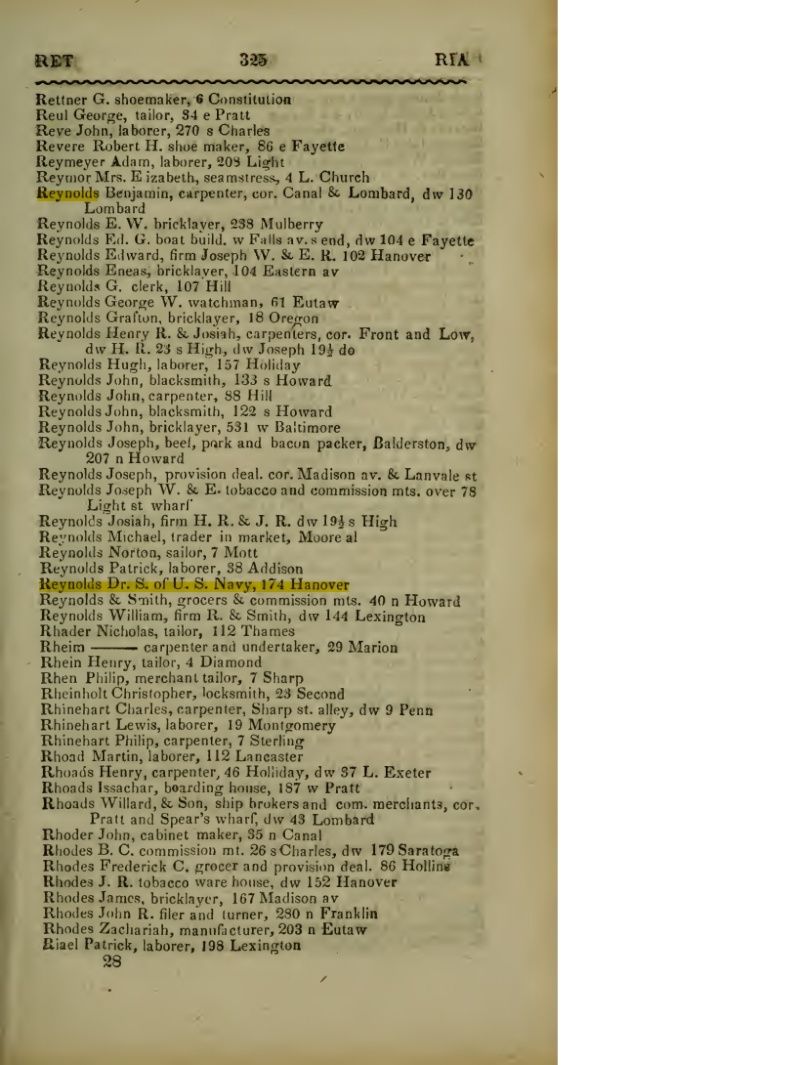
Source: Matchett's Baltimore Directory of 1849, page 325
Dr. J.J. Moran was a vaccine physician employed by the City Government for Ward 11, and would not have been in charge of the hospital. This would be akin to the anesthesiologist being in charge of the hospital. Here is the entry from the Matchett's Baltimore Directory of 1849:
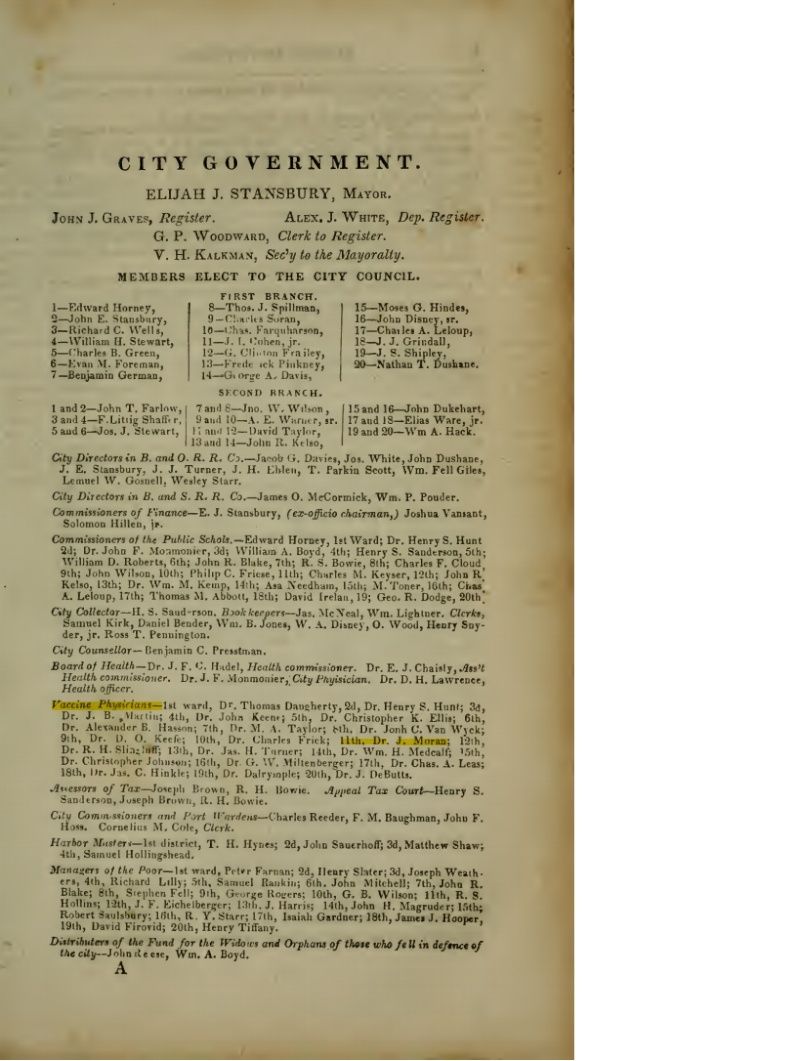
Source: Matchett's Baltimore Directory of 1849, page 500
In 1838, Poe wrote The Narrative of Arthur Gordon Pym of Nantucket, which posited the Hollow Earth theory, on which Jeremiah N. Reynolds would lecture upon. Reynolds spoke before Congress and succeeded in planning a national expedition to the South Pole. The expedition sailed from New York City in 1829.
Unfortunately, I did not find a Jeremiah Reynolds in the Matchett's Baltimore Directory of 1849, but I did find a Dr. S. Reynolds, U.S. Navy doctor on Hanover Street. Was this doctor really at the hospital that night? I believe so, based upon Poe's own words, "Twin devils." By this, he could be referring to Drs. Moran and Reynolds.

Source: Matchett's Baltimore Directory of 1849, page 325
Dr. J.J. Moran was a vaccine physician employed by the City Government for Ward 11, and would not have been in charge of the hospital. This would be akin to the anesthesiologist being in charge of the hospital. Here is the entry from the Matchett's Baltimore Directory of 1849:

Source: Matchett's Baltimore Directory of 1849, page 500
Last edited by Karen on Thu 23 Apr 2015 - 11:53; edited 2 times in total
 Re: The Murder of Edgar Allan Poe
Re: The Murder of Edgar Allan Poe
Also in the article, Dr. Moran asks Poe where he has been staying, to which Poe replies, "At a Pratt Street hotel, opposite the depot." Then Dr. Moran goes on to explain that the hotel Poe was staying at was the Bradshaw's, which according to the Matchett's Baltimore Directory goes by the name of "United States Hotel," at 146 West Pratt Street, Mrs. E. Bradshaw, proprietor.
This hotel was opposite the Baltimore and Ohio Rail Road Depot and upon searching through Matchett's Directories I discovered that there were a few hotels on Pratt Street, opposite the depot.
Matchett's Baltimore Directory for 1847-48
436 HOTELS—DISTANCES.
HOTELS IN BALTIMORE.
Barnum's City Hotel, Monument Square—Z. Barnum & A. McLaughlin, prop'rs.
Exchange Hotel, Exchange Place—D. Dorsey, proprietor.
Fountain Hotel, Light street—Fogg & Thurston, proprietors.
Eutaw House, corner Baltimore and Eutaw streets. Jackson & Cranston, prop'rs.
Wheatfield Inn, N. Howard street, near Balt, st.—J. Mclntosh, Jr., proprietor
Globe Inn, 329 West Baltimore street—Jacob Bohn, proprietor.
United States Hotel, 146 West Pratt street—Mrs. E. Bradshaw, proprietor.
Rational Hotel, 148 and 150 W. Pratt street—J. Ottenkirk, jr. proprietor.
Washington Hotel, 206 W. Pratt street—Smith & Gilman, proprietors,
Gen Wayne Inn, corner Baltimore and Paca streets—C. Goddard, proprietor.
Merchant's Hotel, 17 and 19 S. Charles street—J. Mclntosh, proprietor.
Western Hotel, corner Saratoga and Howard streets—James F. Bayless, proprietor.
Commercial Hotel, Pratt st., opposite Rail Road Depot, Matthias Spangler, prop.
Matthias Spangler had another tavern in Swan Street, Baltimore:
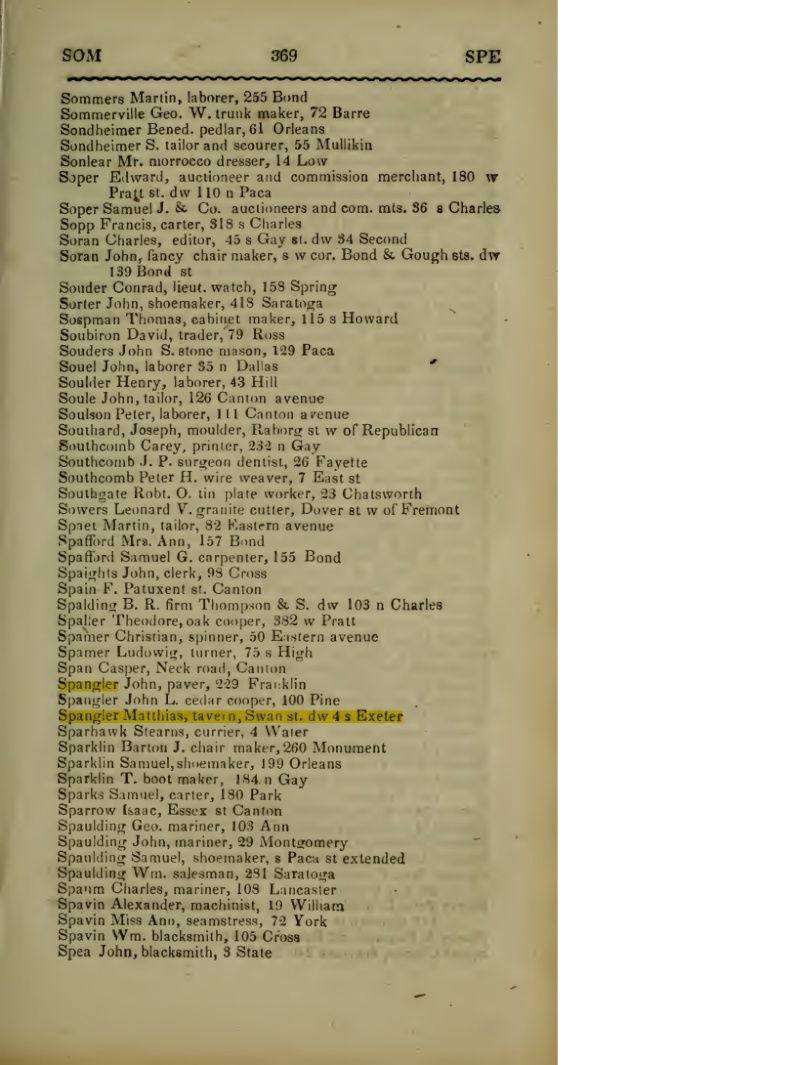
Source: Matchett's Baltimore Directory of 1849, page 369
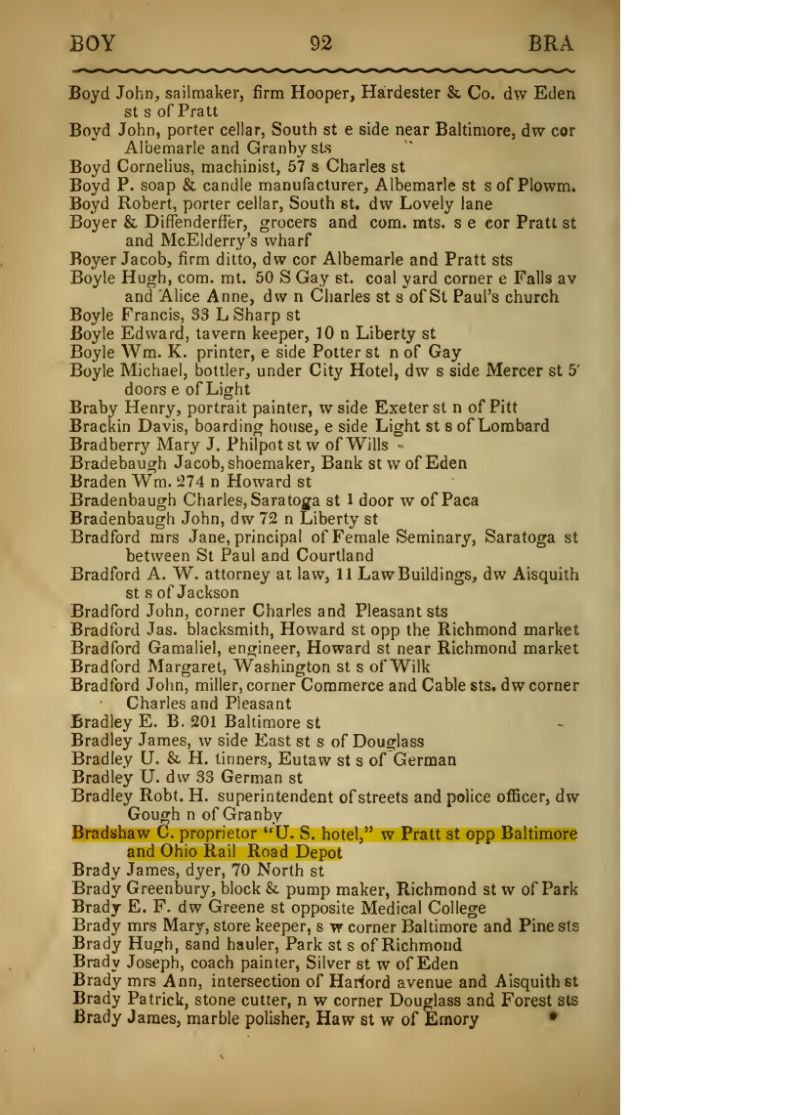
Source: Matchett's Baltimore Directory of 1842, page 92
This hotel was opposite the Baltimore and Ohio Rail Road Depot and upon searching through Matchett's Directories I discovered that there were a few hotels on Pratt Street, opposite the depot.
Matchett's Baltimore Directory for 1847-48
436 HOTELS—DISTANCES.
HOTELS IN BALTIMORE.
Barnum's City Hotel, Monument Square—Z. Barnum & A. McLaughlin, prop'rs.
Exchange Hotel, Exchange Place—D. Dorsey, proprietor.
Fountain Hotel, Light street—Fogg & Thurston, proprietors.
Eutaw House, corner Baltimore and Eutaw streets. Jackson & Cranston, prop'rs.
Wheatfield Inn, N. Howard street, near Balt, st.—J. Mclntosh, Jr., proprietor
Globe Inn, 329 West Baltimore street—Jacob Bohn, proprietor.
United States Hotel, 146 West Pratt street—Mrs. E. Bradshaw, proprietor.
Rational Hotel, 148 and 150 W. Pratt street—J. Ottenkirk, jr. proprietor.
Washington Hotel, 206 W. Pratt street—Smith & Gilman, proprietors,
Gen Wayne Inn, corner Baltimore and Paca streets—C. Goddard, proprietor.
Merchant's Hotel, 17 and 19 S. Charles street—J. Mclntosh, proprietor.
Western Hotel, corner Saratoga and Howard streets—James F. Bayless, proprietor.
Commercial Hotel, Pratt st., opposite Rail Road Depot, Matthias Spangler, prop.
Matthias Spangler had another tavern in Swan Street, Baltimore:

Source: Matchett's Baltimore Directory of 1849, page 369

Source: Matchett's Baltimore Directory of 1842, page 92
Last edited by Karen on Thu 23 Apr 2015 - 11:57; edited 10 times in total
 Re: The Murder of Edgar Allan Poe
Re: The Murder of Edgar Allan Poe
Dr. Moran reported his diagnosis of Poe as being consistent with Encephalitis, but his symptoms also are consistent with arsenic poisoning. Dr. Moran kept giving him toddies, cordials and draughts. These sound remarkably similar to alcoholic beverages, and being a vaccine physician, he would know a great deal about the administration of certain poisons and chemicals. The symptoms of arsenic poisoning are:
*abdominal pain (which Poe claimed to have)
*delirium (which Poe exhibited just prior to his death)
*nausea and vomiting (Poe did state that he was nauseated)
*vertigo (Poe answered in the affirmative when Moran asked him if there was pain in his head, and he further added that his head felt heavy and mind cloudy)
*motor nerve defects (Dr. Moran noticed Poe's eye and face muscles twitching and also noticed certain jerking movements as well. He also remarked upon Poe's nervous excitement and nervous power)
*dehydration (which was not present initially, but did present later on)
In Freemasonry, there are 33 degrees and it is very interesting to note that Arsenic is the 33rd element in the Periodic Table of Elements.
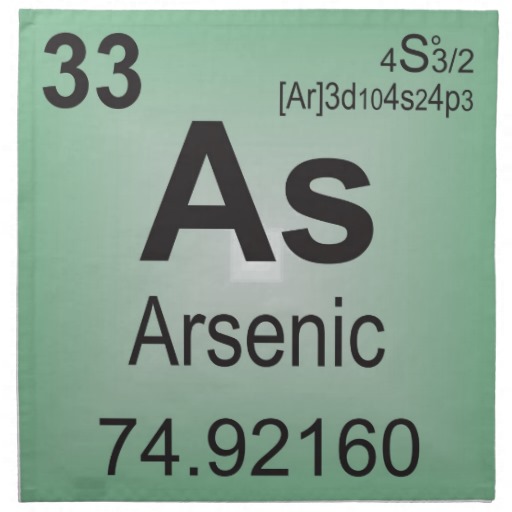
*abdominal pain (which Poe claimed to have)
*delirium (which Poe exhibited just prior to his death)
*nausea and vomiting (Poe did state that he was nauseated)
*vertigo (Poe answered in the affirmative when Moran asked him if there was pain in his head, and he further added that his head felt heavy and mind cloudy)
*motor nerve defects (Dr. Moran noticed Poe's eye and face muscles twitching and also noticed certain jerking movements as well. He also remarked upon Poe's nervous excitement and nervous power)
*dehydration (which was not present initially, but did present later on)
In Freemasonry, there are 33 degrees and it is very interesting to note that Arsenic is the 33rd element in the Periodic Table of Elements.

Last edited by Karen on Wed 22 Apr 2015 - 16:17; edited 1 time in total
 Re: The Murder of Edgar Allan Poe
Re: The Murder of Edgar Allan Poe
Nelson Poe, the cousin of Edgar Allan Poe, attempted to visit the Washington University Hospital to see Edgar while he was being attended to by Dr. Moran and it is reported by other historians that Nelson was refused entry in Poe's room. He was told that Poe was too delirious and ill to receive visitors. I discovered that Nelson Poe was an Attorney-at-Law, at 2 Law Buildings, in St. Paul Street, Baltimore:
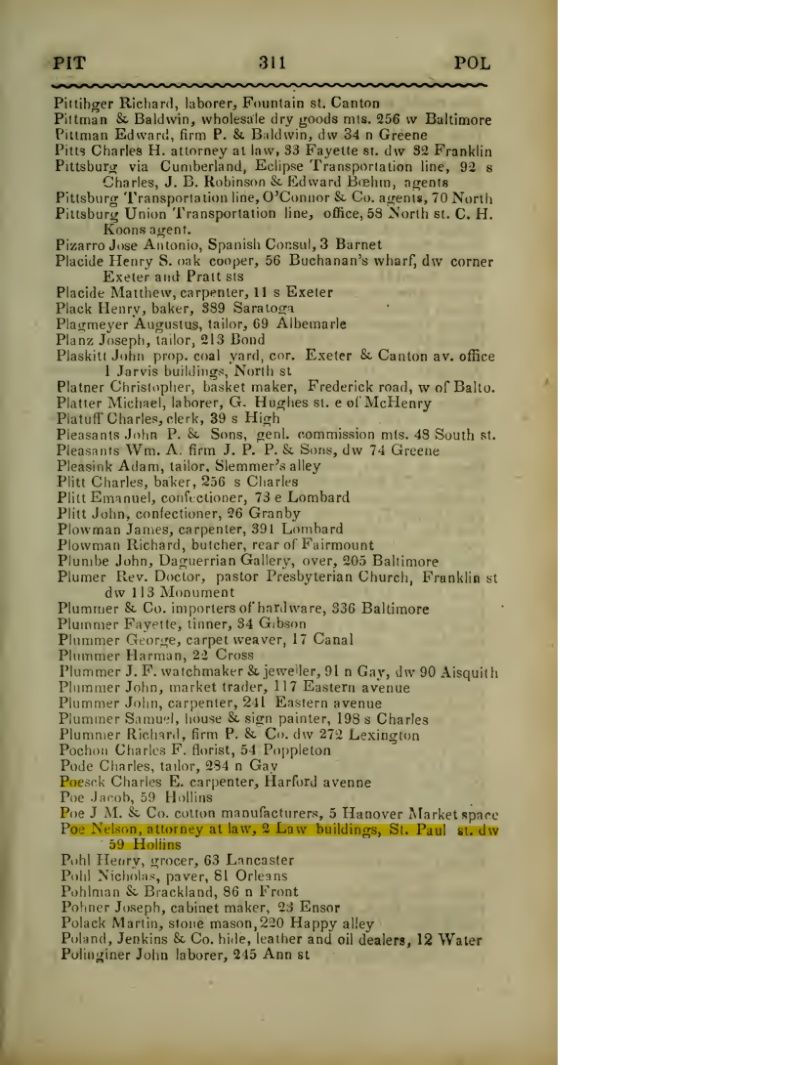
Source: Matchett's Baltimore Directory of 1849, page 311

Source: Matchett's Baltimore Directory of 1849, page 311
Last edited by Karen on Thu 23 Apr 2015 - 11:58; edited 1 time in total
 Re: The Murder of Edgar Allan Poe
Re: The Murder of Edgar Allan Poe
Last edited by Karen on Thu 23 Apr 2015 - 12:14; edited 1 time in total
 Re: The Murder of Edgar Allan Poe
Re: The Murder of Edgar Allan Poe
Continuing the analysis of Dr. John Moran's memoranda, I will now draw your attention to Dr. Moran's statement, "Look to your Savior, Mr. Poe," as Edgar Allan Poe stared at the transom above the door. A transom is a window with a ledge that can be found over a door. I'm sure this comforted Poe in his last hours of anguish, agony and torture.
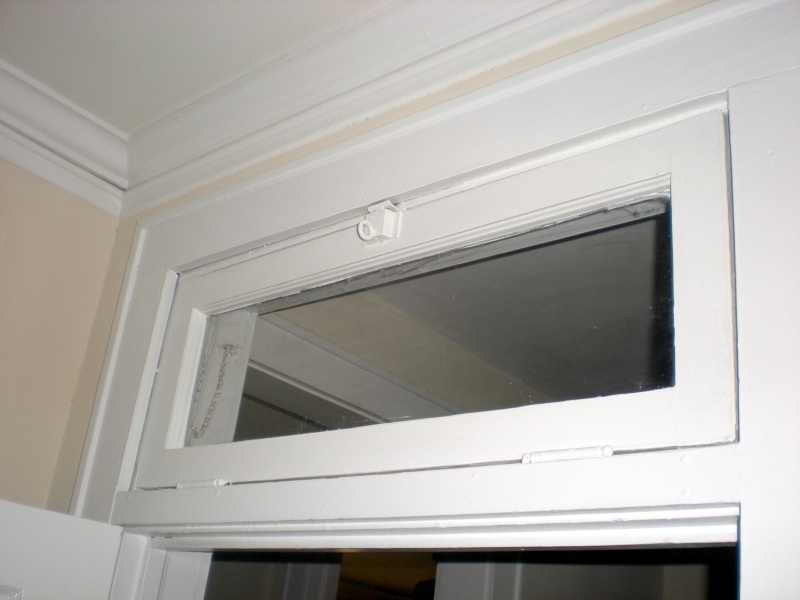
In Poe's most famous poem, "The Raven," the author alludes to, "the bust of Pallas above my chamber door." The raven, who is a bird of ill omen seems to be mocking the poet with the lines, "Nevermore," and "She shall press no more." Pallas is the first name in the phrase Pallas Athena. Pallas was a childhood friend of Athena's, whose name she took along with her own, after the childhood friend accidentally died.
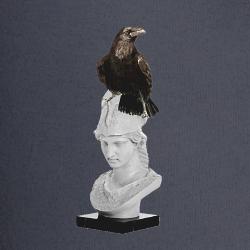
Raven on Pallas Athena bust.
Here is the poem in its entirety:
Over many a quaint and curious volume of forgotten lore,
While I nodded, nearly napping, suddenly there came a tapping,
As of some one gently rapping, rapping at my chamber door.
"'Tis some visitor," I muttered, "tapping at my chamber door -
Only this, and nothing more."
Ah, distinctly I remember it was in the bleak December,
And each separate dying ember wrought its ghost upon the floor.
Eagerly I wished the morrow; - vainly I had sought to borrow
From my books surcease of sorrow - sorrow for the lost Lenore -
For the rare and radiant maiden whom the angels name Lenore -
Nameless here for evermore.
And the silken sad uncertain rustling of each purple curtain
Thrilled me - filled me with fantastic terrors never felt before;
So that now, to still the beating of my heart, I stood repeating,
"'Tis some visitor entreating entrance at my chamber door -
Some late visitor entreating entrance at my chamber door; -
This it is, and nothing more."
Presently my soul grew stronger; hesitating then no longer,
"Sir," said I, "or Madam, truly your forgiveness I implore;
But the fact is I was napping, and so gently you came rapping,
And so faintly you came tapping, tapping at my chamber door,
That I scarce was sure I heard you"- here I opened wide the door; -
Darkness there, and nothing more.
Deep into that darkness peering, long I stood there wondering, fearing,
Doubting, dreaming dreams no mortals ever dared to dream before;
But the silence was unbroken, and the stillness gave no token,
And the only word there spoken was the whispered word, "Lenore?"
This I whispered, and an echo murmured back the word, "Lenore!" -
Merely this, and nothing more.
Back into the chamber turning, all my soul within me burning,
Soon again I heard a tapping somewhat louder than before.
"Surely," said I, "surely that is something at my window lattice:
Let me see, then, what thereat is, and this mystery explore -
Let my heart be still a moment and this mystery explore; -
'Tis the wind and nothing more."
Open here I flung the shutter, when, with many a flirt and flutter,
In there stepped a stately raven of the saintly days of yore;
Not the least obeisance made he; not a minute stopped or stayed he;
But, with mien of lord or lady, perched above my chamber door -
Perched upon a bust of Pallas just above my chamber door -
Perched, and sat, and nothing more.
Then this ebony bird beguiling my sad fancy into smiling,
By the grave and stern decorum of the countenance it wore.
"Though thy crest be shorn and shaven, thou," I said, "art sure no craven,
Ghastly grim and ancient raven wandering from the Nightly shore -
Tell me what thy lordly name is on the Night's Plutonian shore!"
Quoth the Raven, "Nevermore."
Much I marvelled this ungainly fowl to hear discourse so plainly,
Though its answer little meaning- little relevancy bore;
For we cannot help agreeing that no living human being
Ever yet was blest with seeing bird above his chamber door -
Bird or beast upon the sculptured bust above his chamber door,
With such name as "Nevermore."
But the raven, sitting lonely on the placid bust, spoke only
That one word, as if his soul in that one word he did outpour.
Nothing further then he uttered- not a feather then he fluttered -
Till I scarcely more than muttered, "other friends have flown before -
On the morrow he will leave me, as my hopes have flown before."
Then the bird said, "Nevermore."
Startled at the stillness broken by reply so aptly spoken,
"Doubtless," said I, "what it utters is its only stock and store,
Caught from some unhappy master whom unmerciful Disaster
Followed fast and followed faster till his songs one burden bore -
Till the dirges of his Hope that melancholy burden bore
Of 'Never - nevermore'."
But the Raven still beguiling all my fancy into smiling,
Straight I wheeled a cushioned seat in front of bird, and bust and door;
Then upon the velvet sinking, I betook myself to linking
Fancy unto fancy, thinking what this ominous bird of yore -
What this grim, ungainly, ghastly, gaunt and ominous bird of yore
Meant in croaking "Nevermore."
This I sat engaged in guessing, but no syllable expressing
To the fowl whose fiery eyes now burned into my bosom's core;
This and more I sat divining, with my head at ease reclining
On the cushion's velvet lining that the lamplight gloated o'er,
But whose velvet violet lining with the lamplight gloating o'er,
She shall press, ah, nevermore!
Then methought the air grew denser, perfumed from an unseen censer
Swung by Seraphim whose footfalls tinkled on the tufted floor.
"Wretch," I cried, "thy God hath lent thee - by these angels he hath sent thee
Respite - respite and nepenthe, from thy memories of Lenore:
Quaff, oh quaff this kind nepenthe and forget this lost Lenore!"
Quoth the Raven, "Nevermore."
"Prophet!" said I, "thing of evil! - prophet still, if bird or devil! -
Whether Tempter sent, or whether tempest tossed thee here ashore,
Desolate yet all undaunted, on this desert land enchanted -
On this home by horror haunted- tell me truly, I implore -
Is there - is there balm in Gilead? - tell me - tell me, I implore!"
Quoth the Raven, "Nevermore."
"Prophet!" said I, "thing of evil - prophet still, if bird or devil!
By that Heaven that bends above us - by that God we both adore -
Tell this soul with sorrow laden if, within the distant Aidenn,
It shall clasp a sainted maiden whom the angels name Lenore -
Clasp a rare and radiant maiden whom the angels name Lenore."
Quoth the Raven, "Nevermore."
"Be that word our sign in parting, bird or fiend," I shrieked, upstarting -
"Get thee back into the tempest and the Night's Plutonian shore!
Leave no black plume as a token of that lie thy soul hath spoken!
Leave my loneliness unbroken!- quit the bust above my door!
Take thy beak from out my heart, and take thy form from off my door!"
Quoth the Raven, "Nevermore."
And the Raven, never flitting, still is sitting, still is sitting
On the pallid bust of Pallas just above my chamber door;
And his eyes have all the seeming of a demon's that is dreaming,
And the lamplight o'er him streaming throws his shadow on the floor;
And my soul from out that shadow that lies floating on the floor
Shall be lifted - nevermore!

In Poe's most famous poem, "The Raven," the author alludes to, "the bust of Pallas above my chamber door." The raven, who is a bird of ill omen seems to be mocking the poet with the lines, "Nevermore," and "She shall press no more." Pallas is the first name in the phrase Pallas Athena. Pallas was a childhood friend of Athena's, whose name she took along with her own, after the childhood friend accidentally died.

Raven on Pallas Athena bust.
Here is the poem in its entirety:
The Raven by Edgar Allan Poe
Once upon a midnight dreary, while I pondered, weak and weary, Over many a quaint and curious volume of forgotten lore,
While I nodded, nearly napping, suddenly there came a tapping,
As of some one gently rapping, rapping at my chamber door.
"'Tis some visitor," I muttered, "tapping at my chamber door -
Only this, and nothing more."
Ah, distinctly I remember it was in the bleak December,
And each separate dying ember wrought its ghost upon the floor.
Eagerly I wished the morrow; - vainly I had sought to borrow
From my books surcease of sorrow - sorrow for the lost Lenore -
For the rare and radiant maiden whom the angels name Lenore -
Nameless here for evermore.
And the silken sad uncertain rustling of each purple curtain
Thrilled me - filled me with fantastic terrors never felt before;
So that now, to still the beating of my heart, I stood repeating,
"'Tis some visitor entreating entrance at my chamber door -
Some late visitor entreating entrance at my chamber door; -
This it is, and nothing more."
Presently my soul grew stronger; hesitating then no longer,
"Sir," said I, "or Madam, truly your forgiveness I implore;
But the fact is I was napping, and so gently you came rapping,
And so faintly you came tapping, tapping at my chamber door,
That I scarce was sure I heard you"- here I opened wide the door; -
Darkness there, and nothing more.
Deep into that darkness peering, long I stood there wondering, fearing,
Doubting, dreaming dreams no mortals ever dared to dream before;
But the silence was unbroken, and the stillness gave no token,
And the only word there spoken was the whispered word, "Lenore?"
This I whispered, and an echo murmured back the word, "Lenore!" -
Merely this, and nothing more.
Back into the chamber turning, all my soul within me burning,
Soon again I heard a tapping somewhat louder than before.
"Surely," said I, "surely that is something at my window lattice:
Let me see, then, what thereat is, and this mystery explore -
Let my heart be still a moment and this mystery explore; -
'Tis the wind and nothing more."
Open here I flung the shutter, when, with many a flirt and flutter,
In there stepped a stately raven of the saintly days of yore;
Not the least obeisance made he; not a minute stopped or stayed he;
But, with mien of lord or lady, perched above my chamber door -
Perched upon a bust of Pallas just above my chamber door -
Perched, and sat, and nothing more.
Then this ebony bird beguiling my sad fancy into smiling,
By the grave and stern decorum of the countenance it wore.
"Though thy crest be shorn and shaven, thou," I said, "art sure no craven,
Ghastly grim and ancient raven wandering from the Nightly shore -
Tell me what thy lordly name is on the Night's Plutonian shore!"
Quoth the Raven, "Nevermore."
Much I marvelled this ungainly fowl to hear discourse so plainly,
Though its answer little meaning- little relevancy bore;
For we cannot help agreeing that no living human being
Ever yet was blest with seeing bird above his chamber door -
Bird or beast upon the sculptured bust above his chamber door,
With such name as "Nevermore."
But the raven, sitting lonely on the placid bust, spoke only
That one word, as if his soul in that one word he did outpour.
Nothing further then he uttered- not a feather then he fluttered -
Till I scarcely more than muttered, "other friends have flown before -
On the morrow he will leave me, as my hopes have flown before."
Then the bird said, "Nevermore."
Startled at the stillness broken by reply so aptly spoken,
"Doubtless," said I, "what it utters is its only stock and store,
Caught from some unhappy master whom unmerciful Disaster
Followed fast and followed faster till his songs one burden bore -
Till the dirges of his Hope that melancholy burden bore
Of 'Never - nevermore'."
But the Raven still beguiling all my fancy into smiling,
Straight I wheeled a cushioned seat in front of bird, and bust and door;
Then upon the velvet sinking, I betook myself to linking
Fancy unto fancy, thinking what this ominous bird of yore -
What this grim, ungainly, ghastly, gaunt and ominous bird of yore
Meant in croaking "Nevermore."
This I sat engaged in guessing, but no syllable expressing
To the fowl whose fiery eyes now burned into my bosom's core;
This and more I sat divining, with my head at ease reclining
On the cushion's velvet lining that the lamplight gloated o'er,
But whose velvet violet lining with the lamplight gloating o'er,
She shall press, ah, nevermore!
Then methought the air grew denser, perfumed from an unseen censer
Swung by Seraphim whose footfalls tinkled on the tufted floor.
"Wretch," I cried, "thy God hath lent thee - by these angels he hath sent thee
Respite - respite and nepenthe, from thy memories of Lenore:
Quaff, oh quaff this kind nepenthe and forget this lost Lenore!"
Quoth the Raven, "Nevermore."
"Prophet!" said I, "thing of evil! - prophet still, if bird or devil! -
Whether Tempter sent, or whether tempest tossed thee here ashore,
Desolate yet all undaunted, on this desert land enchanted -
On this home by horror haunted- tell me truly, I implore -
Is there - is there balm in Gilead? - tell me - tell me, I implore!"
Quoth the Raven, "Nevermore."
"Prophet!" said I, "thing of evil - prophet still, if bird or devil!
By that Heaven that bends above us - by that God we both adore -
Tell this soul with sorrow laden if, within the distant Aidenn,
It shall clasp a sainted maiden whom the angels name Lenore -
Clasp a rare and radiant maiden whom the angels name Lenore."
Quoth the Raven, "Nevermore."
"Be that word our sign in parting, bird or fiend," I shrieked, upstarting -
"Get thee back into the tempest and the Night's Plutonian shore!
Leave no black plume as a token of that lie thy soul hath spoken!
Leave my loneliness unbroken!- quit the bust above my door!
Take thy beak from out my heart, and take thy form from off my door!"
Quoth the Raven, "Nevermore."
And the Raven, never flitting, still is sitting, still is sitting
On the pallid bust of Pallas just above my chamber door;
And his eyes have all the seeming of a demon's that is dreaming,
And the lamplight o'er him streaming throws his shadow on the floor;
And my soul from out that shadow that lies floating on the floor
Shall be lifted - nevermore!
Last edited by Karen on Sat 25 Apr 2015 - 16:33; edited 1 time in total
 Re: The Murder of Edgar Allan Poe
Re: The Murder of Edgar Allan Poe
Here is some information about Church Hospital (also known as Washington University Hospital), where Poe spent his last days. Included is a lithographic photo of the hospital in 1859.
http://www.eapoe.org/balt/poechh.htm
http://www.eapoe.org/balt/poechh.htm
 Re: The Murder of Edgar Allan Poe
Re: The Murder of Edgar Allan Poe
Edgar also mentioned the Freemasons in his poem "The Cask of Amontillado." In the poem, he points to the trowel as the sign of the Masonic brotherhood.
The Cask of Amontillado
Edgar Allan Poe
THE thousand injuries of Fortunato I had borne as I best could, but when he ventured upon insult, I vowed revenge. You, who so well know the nature of my soul, will not suppose, however, that I gave utterance to a threat. AT LENGTH I would be avenged; this was a point definitively settled -- but the very definitiveness with which it was resolved precluded the idea of risk. I must not only punish, but punish with impunity. A wrong is unredressed when retribution overtakes its redresser. It is equally unredressed when the avenger fails to make himself felt as such to him who has done the wrong.
It must be understood that neither by word nor deed had I given Fortunato cause to doubt my good will. I continued as was my wont, to smile in his face, and he did not perceive that my smile NOW was at the thought of his immolation.
He had a weak point -- this Fortunato -- although in other regards he was a man to be respected and even feared. He prided himself on his connoisseurship in wine. Few Italians have the true virtuoso spirit. For the most part their enthusiasm is adopted to suit the time and opportunity to practise imposture upon the British and Austrian MILLIONAIRES. In painting and gemmary, Fortunato, like his countrymen , was a quack, but in the matter of old wines he was sincere. In this respect I did not differ from him materially; I was skilful in the Italian vintages myself, and bought largely whenever I could.
It was about dusk, one evening during the supreme madness of the carnival season, that I encountered my friend. He accosted me with excessive warmth, for he had been drinking much. The man wore motley. He had on a tight-fitting parti-striped dress and his head was surmounted by the conical cap and bells. I was so pleased to see him, that I thought I should never have done wringing his hand.
I said to him -- "My dear Fortunato, you are luckily met. How remarkably well you are looking to-day! But I have received a pipe of what passes for Amontillado, and I have my doubts."
"How?" said he, "Amontillado? A pipe? Impossible ? And in the middle of the carnival?"
"I have my doubts," I replied; "and I was silly enough to pay the full Amontillado price without consulting you in the matter. You were not to be found, and I was fearful of losing a bargain."
"Amontillado!"
"I have my doubts."
"Amontillado!"
"And I must satisfy them."
"Amontillado!"
"As you are engaged, I am on my way to Luchesi. If any one has a critical turn, it is he. He will tell me" --
"Luchesi cannot tell Amontillado from Sherry."
"And yet some fools will have it that his taste is a match for your own."
"Come let us go."
"Whither?"
"To your vaults."
"My friend, no; I will not impose upon your good nature. I perceive you have an engagement Luchesi" --
"I have no engagement; come."
"My friend, no. It is not the engagement, but the severe cold with which I perceive you are afflicted . The vaults are insufferably damp. They are encrusted with nitre."
"Let us go, nevertheless. The cold is merely nothing. Amontillado! You have been imposed upon; and as for Luchesi, he cannot distinguish Sherry from Amontillado."
Thus speaking, Fortunato possessed himself of my arm. Putting on a mask of black silk and drawing a roquelaire closely about my person, I suffered him to hurry me to my palazzo.
There were no attendants at home; they had absconded to make merry in honour of the time. I had told them that I should not return until the morning and had given them explicit orders not to stir from the house. These orders were sufficient, I well knew, to insure their immediate disappearance , one and all, as soon as my back was turned.
I took from their sconces two flambeaux, and giving one to Fortunato bowed him through several suites of rooms to the archway that led into the vaults. I passed down a long and winding staircase, requesting him to be cautious as he followed. We came at length to the foot of the descent, and stood together on the damp ground of the catacombs of the Montresors.
The gait of my friend was unsteady, and the bells upon his cap jingled as he strode.
"The pipe," said he.
"It is farther on," said I; "but observe the white webwork which gleams from these cavern walls."
He turned towards me and looked into my eyes with two filmy orbs that distilled the rheum of intoxication .
"Nitre?" he asked, at length
"Nitre," I replied. "How long have you had that cough!"
"Ugh! ugh! ugh! -- ugh! ugh! ugh! -- ugh! ugh! ugh! -- ugh! ugh! ugh! -- ugh! ugh! ugh!
My poor friend found it impossible to reply for many minutes.
"It is nothing," he said, at last.
"Come," I said, with decision, we will go back; your health is precious. You are rich, respected, admired, beloved; you are happy as once I was. You are a man to be missed. For me it is no matter. We will go back; you will be ill and I cannot be responsible. Besides, there is Luchesi" --
"Enough," he said; "the cough is a mere nothing; it will not kill me. I shall not die of a cough."
"True -- true," I replied; "and, indeed, I had no intention of alarming you unnecessarily -- but you should use all proper caution. A draught of this Medoc will defend us from the damps."
Here I knocked off the neck of a bottle which I drew from a long row of its fellows that lay upon the mould.
"Drink," I said, presenting him the wine.
He raised it to his lips with a leer. He paused and nodded to me familiarly, while his bells jingled.
"I drink," he said, "to the buried that repose around us."
"And I to your long life."
He again took my arm and we proceeded.
"These vaults," he said, are extensive."
"The Montresors," I replied, "were a great numerous family."
"I forget your arms."
"A huge human foot d'or, in a field azure; the foot crushes a serpent rampant whose fangs are imbedded in the heel."
"And the motto?"
"Nemo me impune lacessit."
"Good!" he said.
The wine sparkled in his eyes and the bells jingled. My own fancy grew warm with the Medoc. We had passed through walls of piled bones, with casks and puncheons intermingling, into the inmost recesses of the catacombs. I paused again, and this time I made bold to seize Fortunato by an arm above the elbow.
"The nitre!" I said: see it increases. It hangs like moss upon the vaults. We are below the river's bed. The drops of moisture trickle among the bones. Come, we will go back ere it is too late. Your cough" --
"It is nothing" he said; "let us go on. But first, another draught of the Medoc."
I broke and reached him a flagon of De Grave. He emptied it at a breath. His eyes flashed with a fierce light. He laughed and threw the bottle upwards with a gesticulation I did not understand.
I looked at him in surprise. He repeated the movement -- a grotesque one.
"You do not comprehend?" he said.
"Not I," I replied.
"Then you are not of the brotherhood."
"How?"
"You are not of the masons."
"Yes, yes," I said "yes! yes."
"You? Impossible! A mason?"
"A mason," I replied.
"A sign," he said.
"It is this," I answered, producing a trowel from beneath the folds of my roquelaire.
"You jest," he exclaimed, recoiling a few paces. "But let us proceed to the Amontillado."
"Be it so," I said, replacing the tool beneath the cloak, and again offering him my arm. He leaned upon it heavily. We continued our route in search of the Amontillado. We passed through a range of low arches, descended, passed on, and descending again, arrived at a deep crypt, in which the foulness of the air caused our flambeaux rather to glow than flame.
At the most remote end of the crypt there appeared another less spacious. Its walls had been lined with human remains piled to the vault overhead , in the fashion of the great catacombs of Paris. Three sides of this interior crypt were still ornamented in this manner. From the fourth the bones had been thrown down, and lay promiscuously upon the earth, forming at one point a mound of some size. Within the wall thus exposed by the displacing of the bones, we perceived a still interior recess, in depth about four feet, in width three, in height six or seven. It seemed to have been constructed for no especial use in itself, but formed merely the interval between two of the colossal supports of the roof of the catacombs, and was backed by one of their circumscribing walls of solid granite.
It was in vain that Fortunato, uplifting his dull torch, endeavoured to pry into the depths of the recess. Its termination the feeble light did not enable us to see.
"Proceed," I said; "herein is the Amontillado. As for Luchesi" --
"He is an ignoramus," interrupted my friend, as he stepped unsteadily forward, while I followed immediately at his heels. In an instant he had reached the extremity of the niche, and finding his progress arrested by the rock, stood stupidly bewildered . A moment more and I had fettered him to the granite. In its surface were two iron staples, distant from each other about two feet, horizontally. From one of these depended a short chain. from the other a padlock. Throwing the links about his waist, it was but the work of a few seconds to secure it. He was too much astounded to resist . Withdrawing the key I stepped back from the recess.
"Pass your hand," I said, "over the wall; you cannot help feeling the nitre. Indeed it is VERY damp. Once more let me IMPLORE you to return. No? Then I must positively leave you. But I must first render you all the little attentions in my power."
"The Amontillado!" ejaculated my friend, not yet recovered from his astonishment.
"True," I replied; "the Amontillado."
As I said these words I busied myself among the pile of bones of which I have before spoken. Throwing them aside, I soon uncovered a quantity of building stone and mortar. With these materials and with the aid of my trowel, I began vigorously to wall up the entrance of the niche.
I had scarcely laid the first tier of my masonry when I discovered that the intoxication of Fortunato had in a great measure worn off. The earliest indication I had of this was a low moaning cry from the depth of the recess. It was NOT the cry of a drunken man. There was then a long and obstinate silence. I laid the second tier, and the third, and the fourth; and then I heard the furious vibrations of the chain. The noise lasted for several minutes, during which, that I might hearken to it with the more satisfaction, I ceased my labours and sat down upon the bones. When at last the clanking subsided , I resumed the trowel, and finished without interruption the fifth, the sixth, and the seventh tier. The wall was now nearly upon a level with my breast. I again paused, and holding the flambeaux over the mason-work, threw a few feeble rays upon the figure within.
A succession of loud and shrill screams, bursting suddenly from the throat of the chained form, seemed to thrust me violently back. For a brief moment I hesitated -- I trembled. Unsheathing my rapier, I began to grope with it about the recess; but the thought of an instant reassured me. I placed my hand upon the solid fabric of the catacombs , and felt satisfied. I reapproached the wall. I replied to the yells of him who clamoured. I reechoed -- I aided -- I surpassed them in volume and in strength. I did this, and the clamourer grew still.
It was now midnight, and my task was drawing to a close. I had completed the eighth, the ninth, and the tenth tier. I had finished a portion of the last and the eleventh; there remained but a single stone to be fitted and plastered in. I struggled with its weight; I placed it partially in its destined position. But now there came from out the niche a low laugh that erected the hairs upon my head. It was succeeded by a sad voice, which I had difficulty in recognising as that of the noble Fortunato. The voice said --
"Ha! ha! ha! -- he! he! -- a very good joke indeed -- an excellent jest. We will have many a rich laugh about it at the palazzo -- he! he! he! -- over our wine -- he! he! he!"
"The Amontillado!" I said.
"He! he! he! -- he! he! he! -- yes, the Amontillado . But is it not getting late? Will not they be awaiting us at the palazzo, the Lady Fortunato and the rest? Let us be gone."
"Yes," I said "let us be gone."
"FOR THE LOVE OF GOD, MONTRESOR!"
"Yes," I said, "for the love of God!"
But to these words I hearkened in vain for a reply. I grew impatient. I called aloud --
"Fortunato!"
No answer. I called again --
"Fortunato!"
No answer still. I thrust a torch through the remaining aperture and let it fall within. There came forth in return only a jingling of the bells. My heart grew sick -- on account of the dampness of the catacombs. I hastened to make an end of my labour. I forced the last stone into its position; I plastered it up. Against the new masonry I reerected the old rampart of bones. For the half of a century no mortal has disturbed them.
In pace requiescat!
The Cask of Amontillado
Edgar Allan Poe
THE thousand injuries of Fortunato I had borne as I best could, but when he ventured upon insult, I vowed revenge. You, who so well know the nature of my soul, will not suppose, however, that I gave utterance to a threat. AT LENGTH I would be avenged; this was a point definitively settled -- but the very definitiveness with which it was resolved precluded the idea of risk. I must not only punish, but punish with impunity. A wrong is unredressed when retribution overtakes its redresser. It is equally unredressed when the avenger fails to make himself felt as such to him who has done the wrong.
It must be understood that neither by word nor deed had I given Fortunato cause to doubt my good will. I continued as was my wont, to smile in his face, and he did not perceive that my smile NOW was at the thought of his immolation.
He had a weak point -- this Fortunato -- although in other regards he was a man to be respected and even feared. He prided himself on his connoisseurship in wine. Few Italians have the true virtuoso spirit. For the most part their enthusiasm is adopted to suit the time and opportunity to practise imposture upon the British and Austrian MILLIONAIRES. In painting and gemmary, Fortunato, like his countrymen , was a quack, but in the matter of old wines he was sincere. In this respect I did not differ from him materially; I was skilful in the Italian vintages myself, and bought largely whenever I could.
It was about dusk, one evening during the supreme madness of the carnival season, that I encountered my friend. He accosted me with excessive warmth, for he had been drinking much. The man wore motley. He had on a tight-fitting parti-striped dress and his head was surmounted by the conical cap and bells. I was so pleased to see him, that I thought I should never have done wringing his hand.
I said to him -- "My dear Fortunato, you are luckily met. How remarkably well you are looking to-day! But I have received a pipe of what passes for Amontillado, and I have my doubts."
"How?" said he, "Amontillado? A pipe? Impossible ? And in the middle of the carnival?"
"I have my doubts," I replied; "and I was silly enough to pay the full Amontillado price without consulting you in the matter. You were not to be found, and I was fearful of losing a bargain."
"Amontillado!"
"I have my doubts."
"Amontillado!"
"And I must satisfy them."
"Amontillado!"
"As you are engaged, I am on my way to Luchesi. If any one has a critical turn, it is he. He will tell me" --
"Luchesi cannot tell Amontillado from Sherry."
"And yet some fools will have it that his taste is a match for your own."
"Come let us go."
"Whither?"
"To your vaults."
"My friend, no; I will not impose upon your good nature. I perceive you have an engagement Luchesi" --
"I have no engagement; come."
"My friend, no. It is not the engagement, but the severe cold with which I perceive you are afflicted . The vaults are insufferably damp. They are encrusted with nitre."
"Let us go, nevertheless. The cold is merely nothing. Amontillado! You have been imposed upon; and as for Luchesi, he cannot distinguish Sherry from Amontillado."
Thus speaking, Fortunato possessed himself of my arm. Putting on a mask of black silk and drawing a roquelaire closely about my person, I suffered him to hurry me to my palazzo.
There were no attendants at home; they had absconded to make merry in honour of the time. I had told them that I should not return until the morning and had given them explicit orders not to stir from the house. These orders were sufficient, I well knew, to insure their immediate disappearance , one and all, as soon as my back was turned.
I took from their sconces two flambeaux, and giving one to Fortunato bowed him through several suites of rooms to the archway that led into the vaults. I passed down a long and winding staircase, requesting him to be cautious as he followed. We came at length to the foot of the descent, and stood together on the damp ground of the catacombs of the Montresors.
The gait of my friend was unsteady, and the bells upon his cap jingled as he strode.
"The pipe," said he.
"It is farther on," said I; "but observe the white webwork which gleams from these cavern walls."
He turned towards me and looked into my eyes with two filmy orbs that distilled the rheum of intoxication .
"Nitre?" he asked, at length
"Nitre," I replied. "How long have you had that cough!"
"Ugh! ugh! ugh! -- ugh! ugh! ugh! -- ugh! ugh! ugh! -- ugh! ugh! ugh! -- ugh! ugh! ugh!
My poor friend found it impossible to reply for many minutes.
"It is nothing," he said, at last.
"Come," I said, with decision, we will go back; your health is precious. You are rich, respected, admired, beloved; you are happy as once I was. You are a man to be missed. For me it is no matter. We will go back; you will be ill and I cannot be responsible. Besides, there is Luchesi" --
"Enough," he said; "the cough is a mere nothing; it will not kill me. I shall not die of a cough."
"True -- true," I replied; "and, indeed, I had no intention of alarming you unnecessarily -- but you should use all proper caution. A draught of this Medoc will defend us from the damps."
Here I knocked off the neck of a bottle which I drew from a long row of its fellows that lay upon the mould.
"Drink," I said, presenting him the wine.
He raised it to his lips with a leer. He paused and nodded to me familiarly, while his bells jingled.
"I drink," he said, "to the buried that repose around us."
"And I to your long life."
He again took my arm and we proceeded.
"These vaults," he said, are extensive."
"The Montresors," I replied, "were a great numerous family."
"I forget your arms."
"A huge human foot d'or, in a field azure; the foot crushes a serpent rampant whose fangs are imbedded in the heel."
"And the motto?"
"Nemo me impune lacessit."
"Good!" he said.
The wine sparkled in his eyes and the bells jingled. My own fancy grew warm with the Medoc. We had passed through walls of piled bones, with casks and puncheons intermingling, into the inmost recesses of the catacombs. I paused again, and this time I made bold to seize Fortunato by an arm above the elbow.
"The nitre!" I said: see it increases. It hangs like moss upon the vaults. We are below the river's bed. The drops of moisture trickle among the bones. Come, we will go back ere it is too late. Your cough" --
"It is nothing" he said; "let us go on. But first, another draught of the Medoc."
I broke and reached him a flagon of De Grave. He emptied it at a breath. His eyes flashed with a fierce light. He laughed and threw the bottle upwards with a gesticulation I did not understand.
I looked at him in surprise. He repeated the movement -- a grotesque one.
"You do not comprehend?" he said.
"Not I," I replied.
"Then you are not of the brotherhood."
"How?"
"You are not of the masons."
"Yes, yes," I said "yes! yes."
"You? Impossible! A mason?"
"A mason," I replied.
"A sign," he said.
"It is this," I answered, producing a trowel from beneath the folds of my roquelaire.
"You jest," he exclaimed, recoiling a few paces. "But let us proceed to the Amontillado."
"Be it so," I said, replacing the tool beneath the cloak, and again offering him my arm. He leaned upon it heavily. We continued our route in search of the Amontillado. We passed through a range of low arches, descended, passed on, and descending again, arrived at a deep crypt, in which the foulness of the air caused our flambeaux rather to glow than flame.
At the most remote end of the crypt there appeared another less spacious. Its walls had been lined with human remains piled to the vault overhead , in the fashion of the great catacombs of Paris. Three sides of this interior crypt were still ornamented in this manner. From the fourth the bones had been thrown down, and lay promiscuously upon the earth, forming at one point a mound of some size. Within the wall thus exposed by the displacing of the bones, we perceived a still interior recess, in depth about four feet, in width three, in height six or seven. It seemed to have been constructed for no especial use in itself, but formed merely the interval between two of the colossal supports of the roof of the catacombs, and was backed by one of their circumscribing walls of solid granite.
It was in vain that Fortunato, uplifting his dull torch, endeavoured to pry into the depths of the recess. Its termination the feeble light did not enable us to see.
"Proceed," I said; "herein is the Amontillado. As for Luchesi" --
"He is an ignoramus," interrupted my friend, as he stepped unsteadily forward, while I followed immediately at his heels. In an instant he had reached the extremity of the niche, and finding his progress arrested by the rock, stood stupidly bewildered . A moment more and I had fettered him to the granite. In its surface were two iron staples, distant from each other about two feet, horizontally. From one of these depended a short chain. from the other a padlock. Throwing the links about his waist, it was but the work of a few seconds to secure it. He was too much astounded to resist . Withdrawing the key I stepped back from the recess.
"Pass your hand," I said, "over the wall; you cannot help feeling the nitre. Indeed it is VERY damp. Once more let me IMPLORE you to return. No? Then I must positively leave you. But I must first render you all the little attentions in my power."
"The Amontillado!" ejaculated my friend, not yet recovered from his astonishment.
"True," I replied; "the Amontillado."
As I said these words I busied myself among the pile of bones of which I have before spoken. Throwing them aside, I soon uncovered a quantity of building stone and mortar. With these materials and with the aid of my trowel, I began vigorously to wall up the entrance of the niche.
I had scarcely laid the first tier of my masonry when I discovered that the intoxication of Fortunato had in a great measure worn off. The earliest indication I had of this was a low moaning cry from the depth of the recess. It was NOT the cry of a drunken man. There was then a long and obstinate silence. I laid the second tier, and the third, and the fourth; and then I heard the furious vibrations of the chain. The noise lasted for several minutes, during which, that I might hearken to it with the more satisfaction, I ceased my labours and sat down upon the bones. When at last the clanking subsided , I resumed the trowel, and finished without interruption the fifth, the sixth, and the seventh tier. The wall was now nearly upon a level with my breast. I again paused, and holding the flambeaux over the mason-work, threw a few feeble rays upon the figure within.
A succession of loud and shrill screams, bursting suddenly from the throat of the chained form, seemed to thrust me violently back. For a brief moment I hesitated -- I trembled. Unsheathing my rapier, I began to grope with it about the recess; but the thought of an instant reassured me. I placed my hand upon the solid fabric of the catacombs , and felt satisfied. I reapproached the wall. I replied to the yells of him who clamoured. I reechoed -- I aided -- I surpassed them in volume and in strength. I did this, and the clamourer grew still.
It was now midnight, and my task was drawing to a close. I had completed the eighth, the ninth, and the tenth tier. I had finished a portion of the last and the eleventh; there remained but a single stone to be fitted and plastered in. I struggled with its weight; I placed it partially in its destined position. But now there came from out the niche a low laugh that erected the hairs upon my head. It was succeeded by a sad voice, which I had difficulty in recognising as that of the noble Fortunato. The voice said --
"Ha! ha! ha! -- he! he! -- a very good joke indeed -- an excellent jest. We will have many a rich laugh about it at the palazzo -- he! he! he! -- over our wine -- he! he! he!"
"The Amontillado!" I said.
"He! he! he! -- he! he! he! -- yes, the Amontillado . But is it not getting late? Will not they be awaiting us at the palazzo, the Lady Fortunato and the rest? Let us be gone."
"Yes," I said "let us be gone."
"FOR THE LOVE OF GOD, MONTRESOR!"
"Yes," I said, "for the love of God!"
But to these words I hearkened in vain for a reply. I grew impatient. I called aloud --
"Fortunato!"
No answer. I called again --
"Fortunato!"
No answer still. I thrust a torch through the remaining aperture and let it fall within. There came forth in return only a jingling of the bells. My heart grew sick -- on account of the dampness of the catacombs. I hastened to make an end of my labour. I forced the last stone into its position; I plastered it up. Against the new masonry I reerected the old rampart of bones. For the half of a century no mortal has disturbed them.
In pace requiescat!
 Re: The Murder of Edgar Allan Poe
Re: The Murder of Edgar Allan Poe
Dr. John Moran was a vaccine physician for the 11th Ward, and I found some information about the streets encompassed within this ward. Note Pratt Street (where Poe's hotel was situated), Hanover Street (where Dr. Reynolds lived), and Baltimore Street (where Dr. Reynolds lived earlier on.)
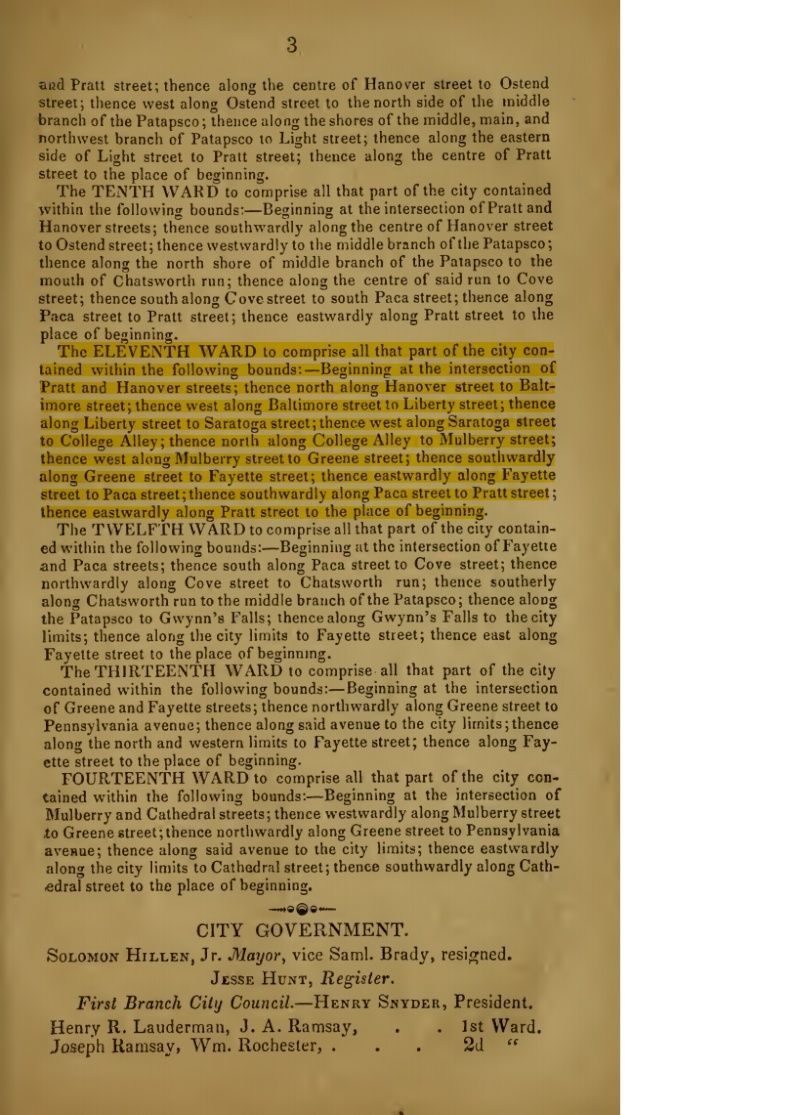
Source: Matchett's Baltimore Directory of 1842, page 3

Source: Matchett's Baltimore Directory of 1842, page 3
 Re: The Murder of Edgar Allan Poe
Re: The Murder of Edgar Allan Poe
Well, apparently, Dr. J.J. Moran was unethical as per this new information found. It was found among the personal papers of a Baltmore County surveyor which managed to find their way into the Maryland State Archives:
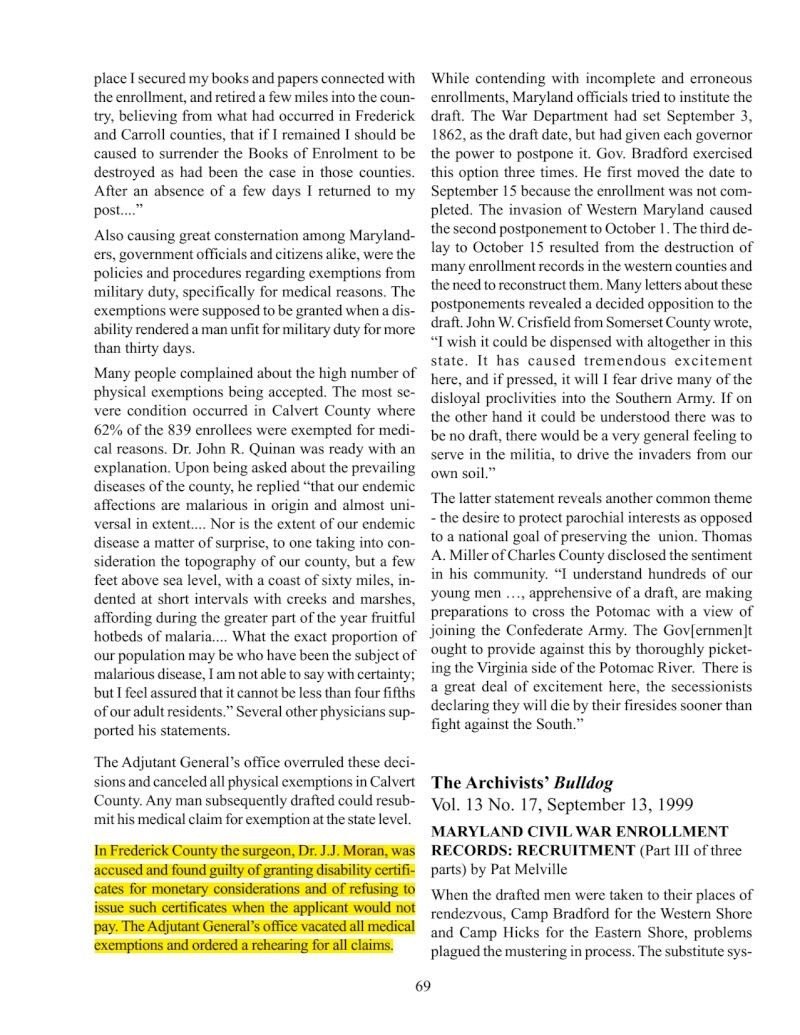
Source: "Bites from The Archivists' Bulldog," page 69
Source: http://msa.maryland.gov/msa/refserv/bulldog/bull99/bull13-15/html/bull13-15.html

Source: "Bites from The Archivists' Bulldog," page 69
Source: http://msa.maryland.gov/msa/refserv/bulldog/bull99/bull13-15/html/bull13-15.html
Last edited by Karen on Sun 26 Apr 2015 - 20:37; edited 1 time in total
 Re: The Murder of Edgar Allan Poe
Re: The Murder of Edgar Allan Poe
I will post up all of the entries for the "U.S. Hotel" from the Matchett's Baltimore Directories through the 1830's and 1840's. It seems that the Bradshaw family kept the tavern in their name throughout.
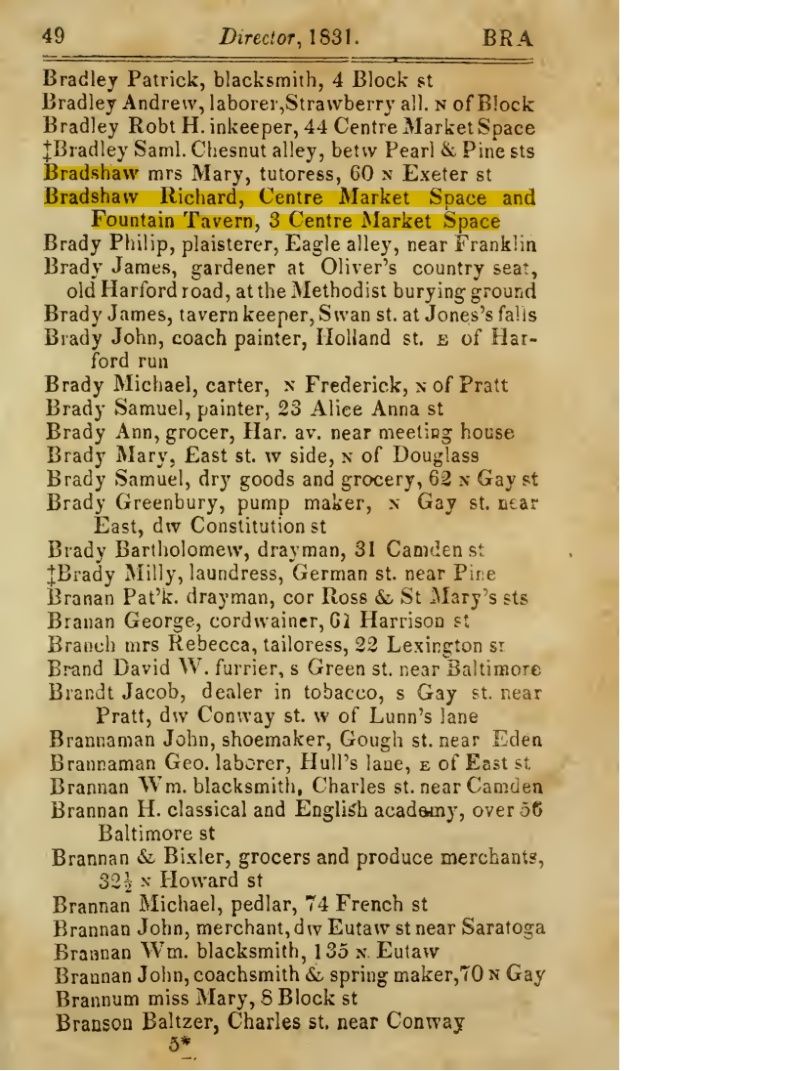
Source: Matchett's Baltimore Directory of 1831, page 49
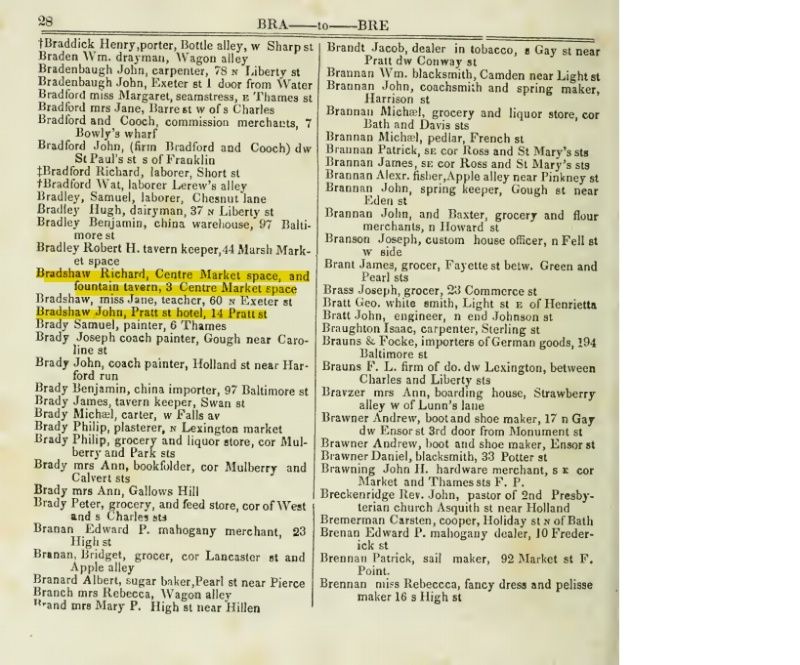
Source: Matchett's Baltimore Directory of 1833, page 28
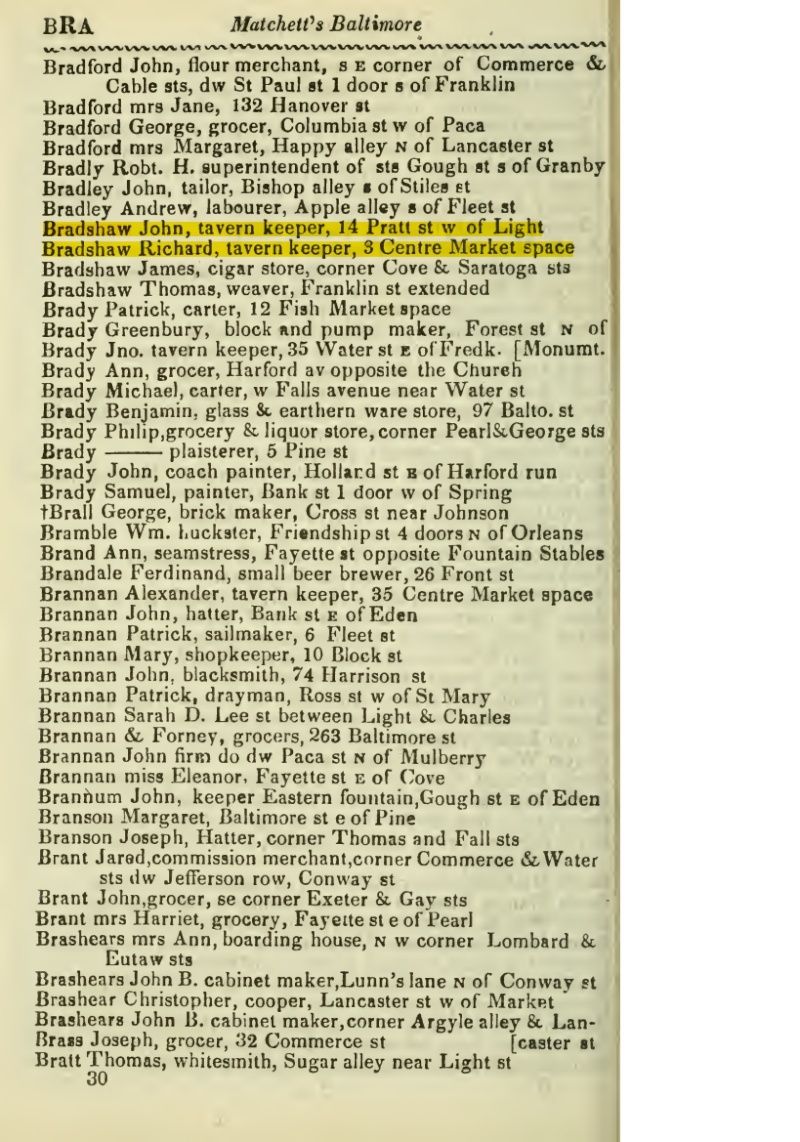
Source: Matchett's Baltimore Directory of 1835, page 30
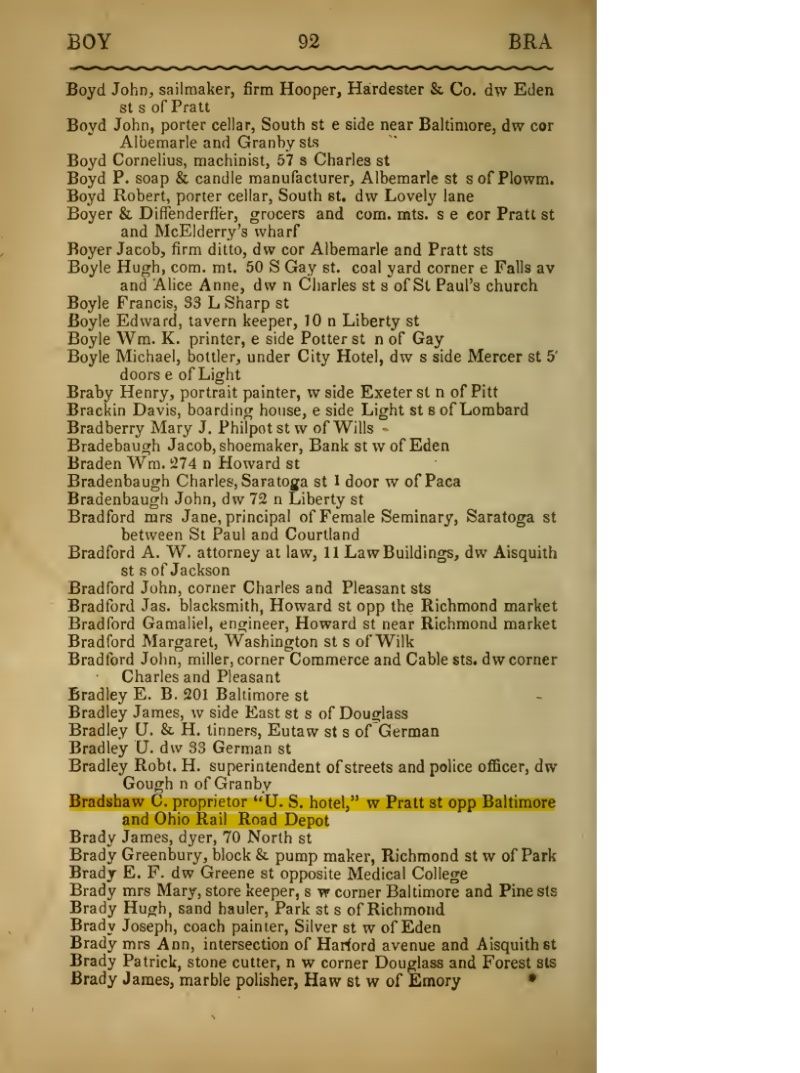
Source: Matchett's Baltimore Directory of 1842, page 92
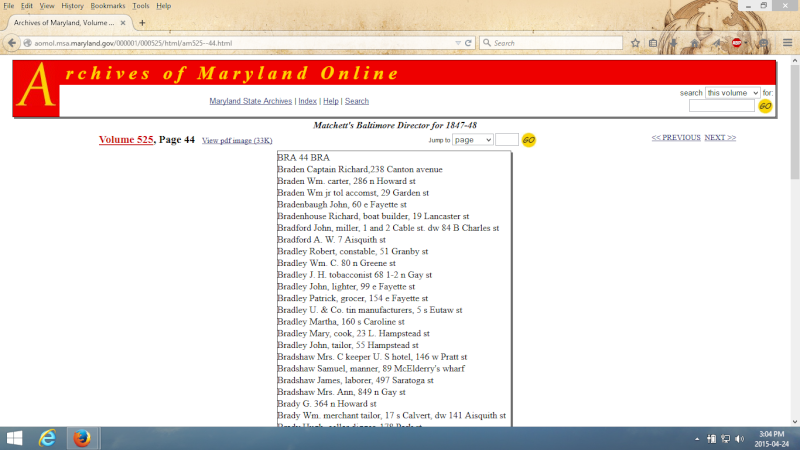
Source: Matchett's Baltimore Directory of 1847-48, page 44
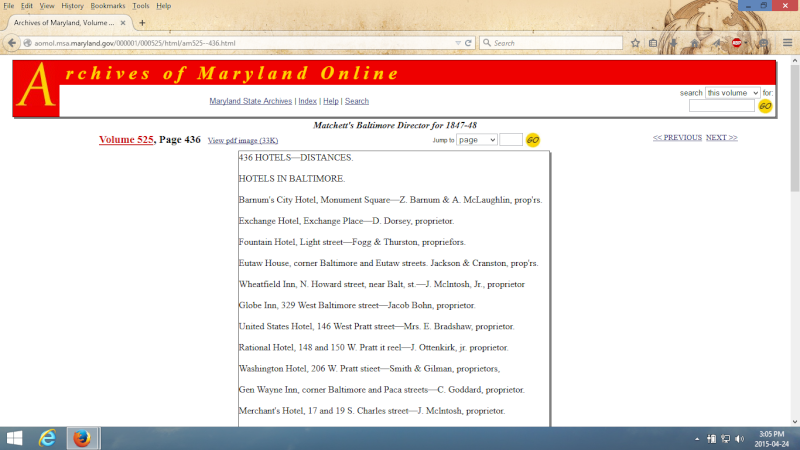
Source: Matchett's Baltimore Directory of 1847-48, page 436

Source: Matchett's Baltimore Directory of 1831, page 49

Source: Matchett's Baltimore Directory of 1833, page 28

Source: Matchett's Baltimore Directory of 1835, page 30

Source: Matchett's Baltimore Directory of 1842, page 92

Source: Matchett's Baltimore Directory of 1847-48, page 44

Source: Matchett's Baltimore Directory of 1847-48, page 436
Last edited by Karen on Sun 26 Apr 2015 - 20:38; edited 1 time in total
 Another Bird of Ill Omen
Another Bird of Ill Omen
The Eagle is another bird of prey, and I now know that Edgar Allan Poe was staying at the Eagle Hotel on Pratt Street, opposite the railroad depot, because Dr. J.J. Moran, himself, stated that Poe was en route to Philadelphia on the cars. The Eagle Hotel, which is situated opposite the Philadelphia and Washington Railroad depot, had lodging for 300 persons, and Poe left his trunk in the hotel. Bradshaw's was just a tavern and it isn't even a certainty that there was lodging facilities there. In addition, the new Poe Statue in Boston is on the corner of Charles Street and Boylston Street. Note that the Eagle Hotel is situated between Light Street and Charles Street. Here is an advertisement from the 1842 Matchett's Directory:
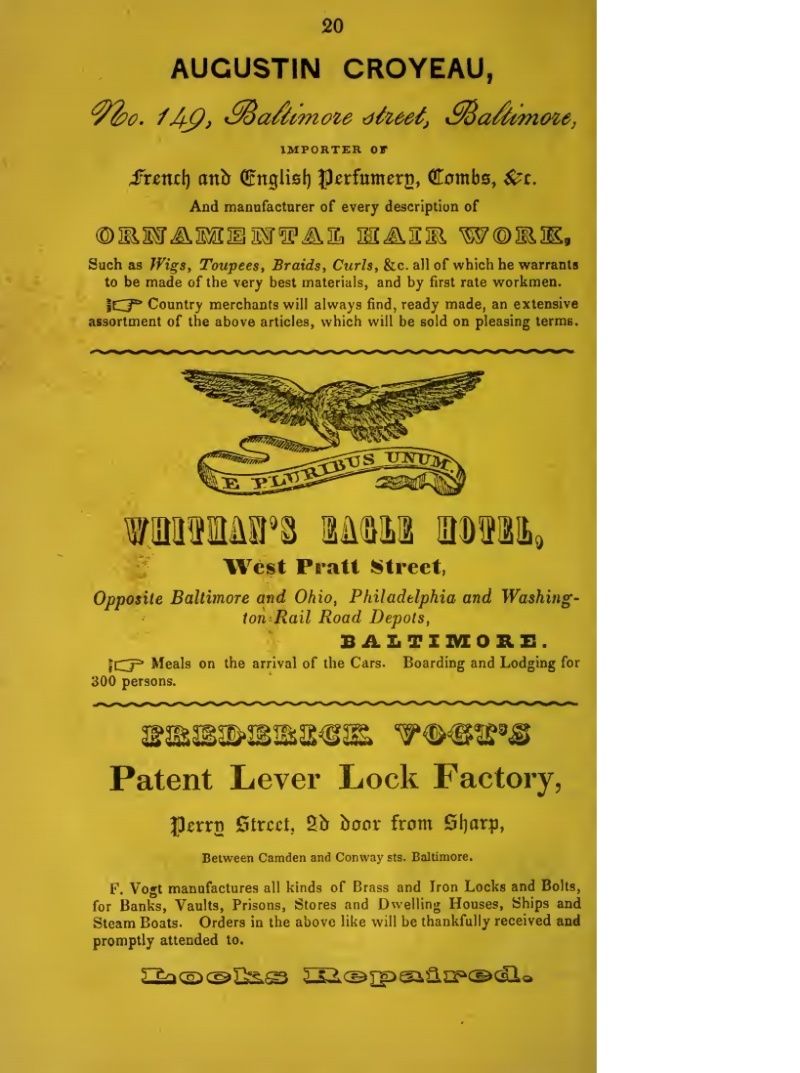
Source: Matchett's Baltimore Directory of 1842, page 20
The proprietor of the Eagle Hotel was Whitfield Whitman:
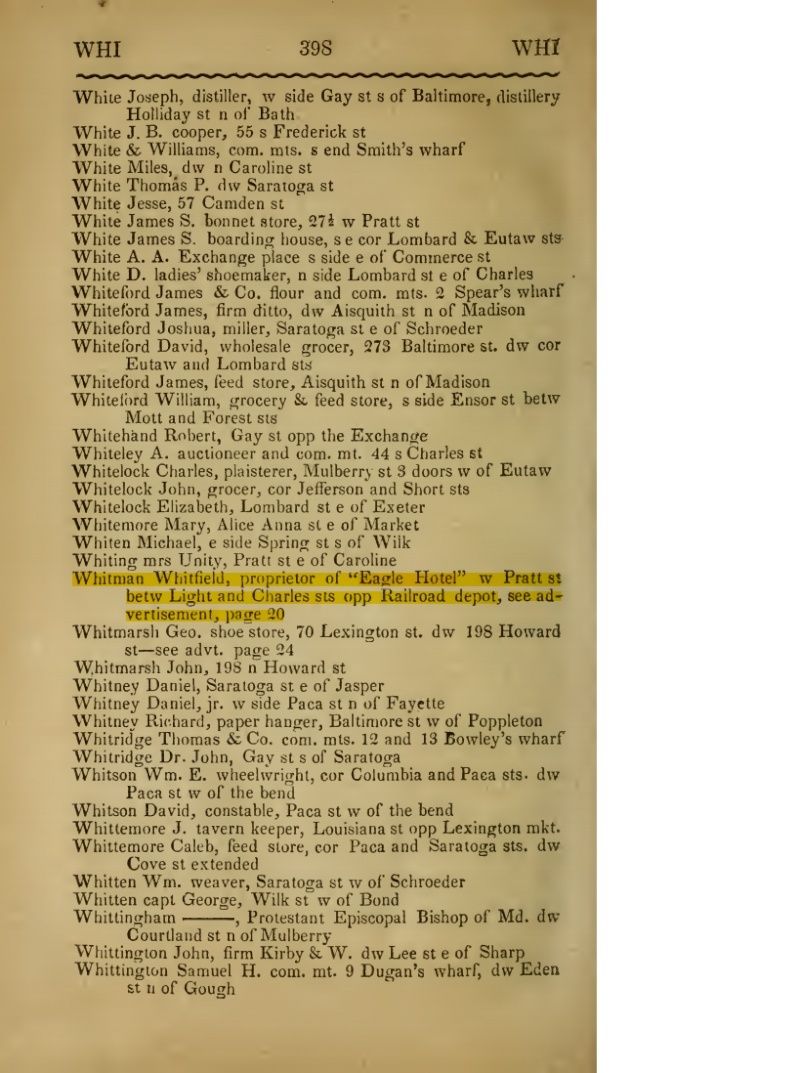
Source: Matchett's Baltimore Directory of 1842, page 398

Source: Matchett's Baltimore Directory of 1842, page 20
The proprietor of the Eagle Hotel was Whitfield Whitman:

Source: Matchett's Baltimore Directory of 1842, page 398
Last edited by Karen on Sun 26 Apr 2015 - 20:40; edited 2 times in total
 Re: The Murder of Edgar Allan Poe
Re: The Murder of Edgar Allan Poe
I would like to also add a few important points about the advertisement for the Eagle Hotel on Pratt Street. It states that meals are available on the arrival of the Cars. So did Poe have anything to eat or drink on this train? The article claims that the train conductor, while going around collecting the passengers' tickets, found Poe in an insensible condition in the baggage car. Then the conductor brought him as far as Havre de Grace, then sent him back to Baltimore on another passing train, where he was found lying on a bench near the Light Street Wharf. The directory listing describes the hotel as being situated between Light and Charles Streets.
 Re: The Murder of Edgar Allan Poe
Re: The Murder of Edgar Allan Poe
It seems that Dr. John J. Moran was not entirely honest in his memoranda on Poe's last days. He deposed that Poe was staying at Bradshaw's Hotel, located at 14 Pratt Street, when in actuality, Poe was staying at the Eagle Hotel, which was located at 13 Pratt Street. So, the Eagle was next door to the U.S. Hotel. Moran gave us the wrong hotel to throw us off of the scent.
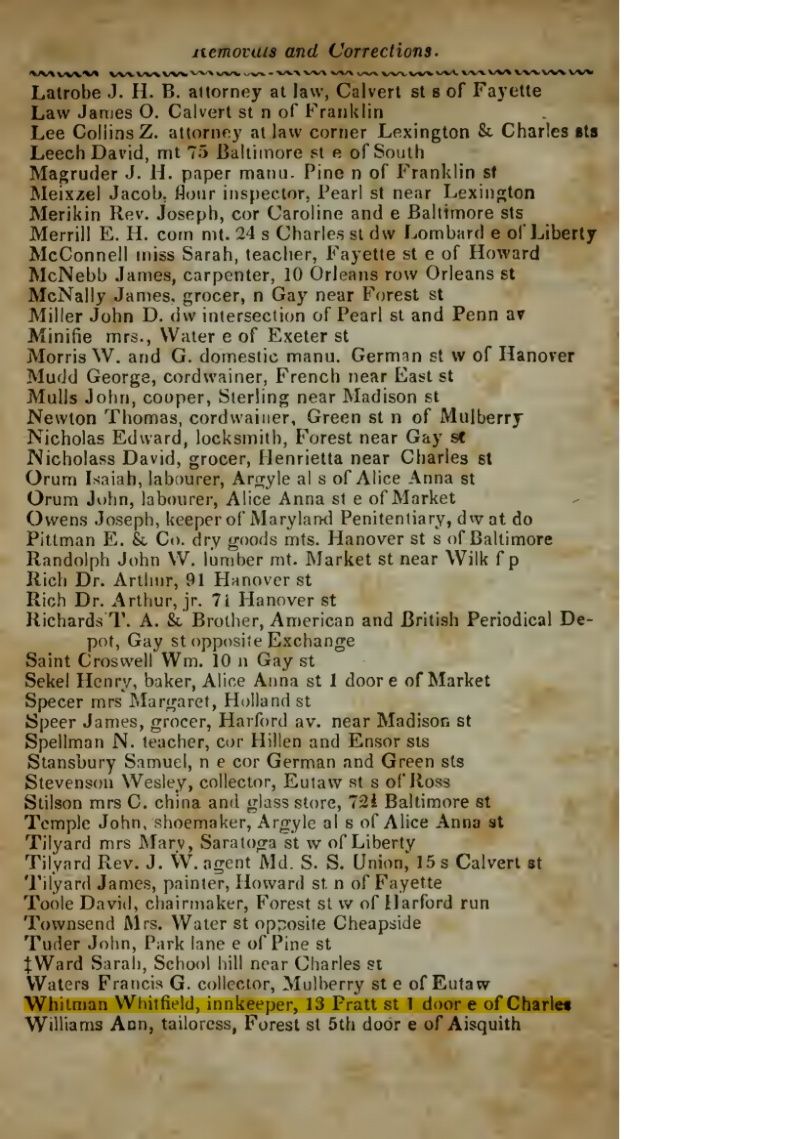
Source: Matchett's Baltimore Directory of 1837, page 398

Source: Matchett's Baltimore Directory of 1837, page 398
Last edited by Karen on Sun 26 Apr 2015 - 20:41; edited 1 time in total
 Nelson Poe
Nelson Poe
Nelson Poe, an attorney-at-law, was also the editor of the Chronicle Commercial and Daily Marylander. Here are all of the entries that I could find on him in Baltimore Directories:
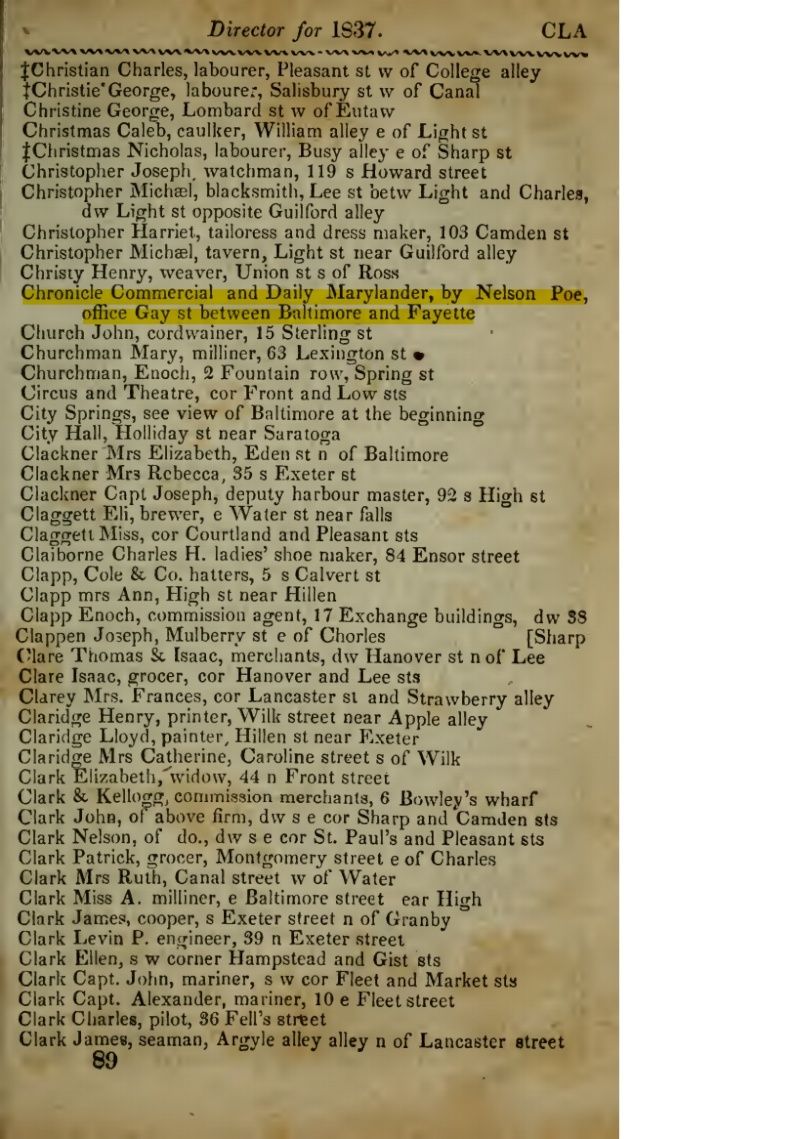
Source: Matchett's Baltimore Directory of 1837, page 89
This entry lists him as Neilson Poe:

Source: Matchett's Baltimore Directory of 1842, page 310
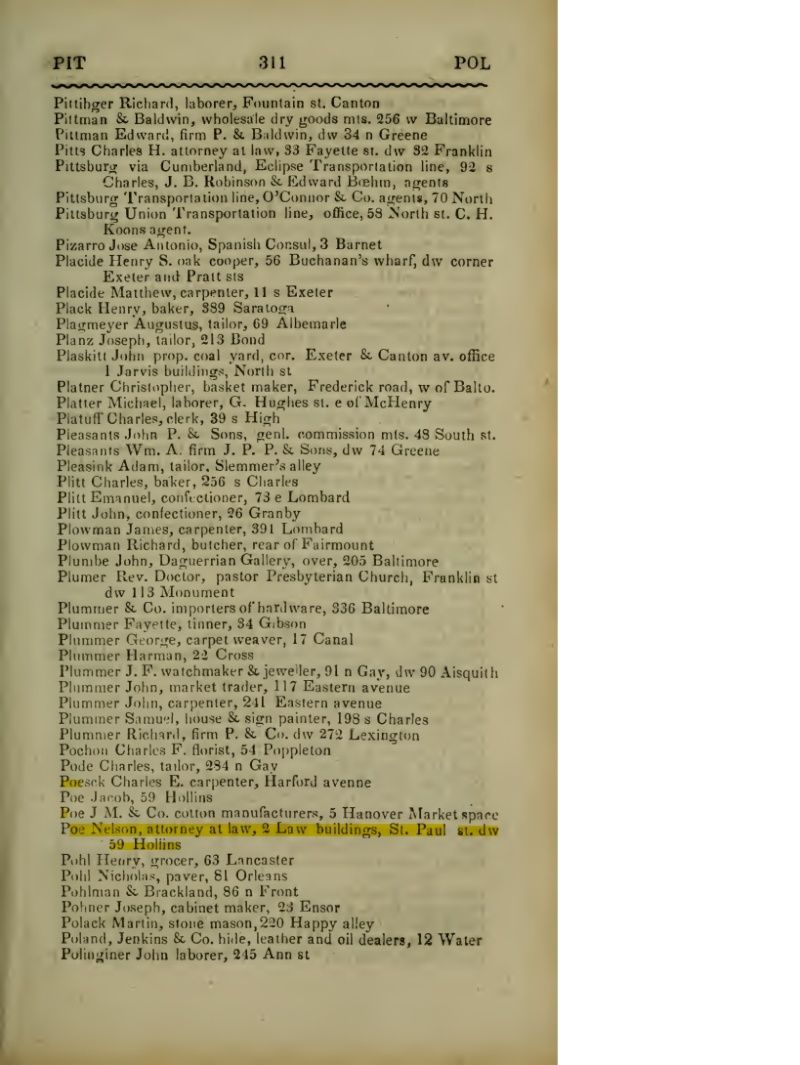
Source: Matchett's Baltimore Directory of 1849, page 311

Source: Matchett's Baltimore Directory of 1837, page 89
This entry lists him as Neilson Poe:

Source: Matchett's Baltimore Directory of 1842, page 310

Source: Matchett's Baltimore Directory of 1849, page 311
Last edited by Karen on Sun 26 Apr 2015 - 20:42; edited 1 time in total
 Re: The Murder of Edgar Allan Poe
Re: The Murder of Edgar Allan Poe
Last edited by Karen on Sun 26 Apr 2015 - 20:43; edited 1 time in total
 Re: The Murder of Edgar Allan Poe
Re: The Murder of Edgar Allan Poe
Last edited by Karen on Sun 26 Apr 2015 - 20:43; edited 1 time in total
 Re: The Murder of Edgar Allan Poe
Re: The Murder of Edgar Allan Poe
Last edited by Karen on Sun 26 Apr 2015 - 20:44; edited 1 time in total
 Re: The Murder of Edgar Allan Poe
Re: The Murder of Edgar Allan Poe
It appears that Dr. John J. Moran has been caught in another lie, as according to his memoranda, he reported that Poe was brought to the Washington College Hospital on the corner of Fayette Street and Broadway Street. That is this hospital:
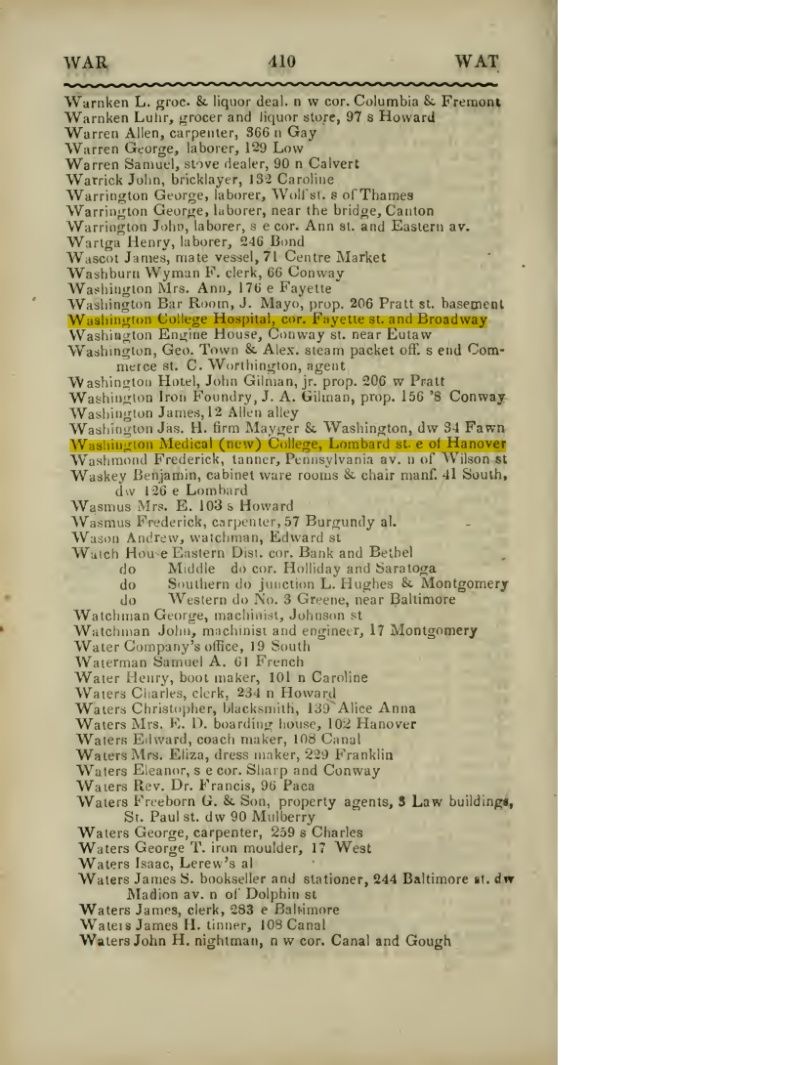
Source: Matchett's Baltimore Directory of 1849, page 410
However, there was another hospital with a very similiar name, located on the corner of Lombard and Broadway, which was connected to the Washington University of Baltimore, and in the following advertisement, you will see that it had special facilities for sailors of the U.S. Navy to come for medical advice or assistance, as per order of the U.S. Navy. This is the correct hospital in which Edgar Allan Poe spent the final days and/or hours of his life. This gives credence to the fact that Dr. S. Reynold was a physician in the U.S. Navy and lived in Hanover Street, which street name you can find in the following:

Source: Matchett's Baltimore Directory of 1842, page 16
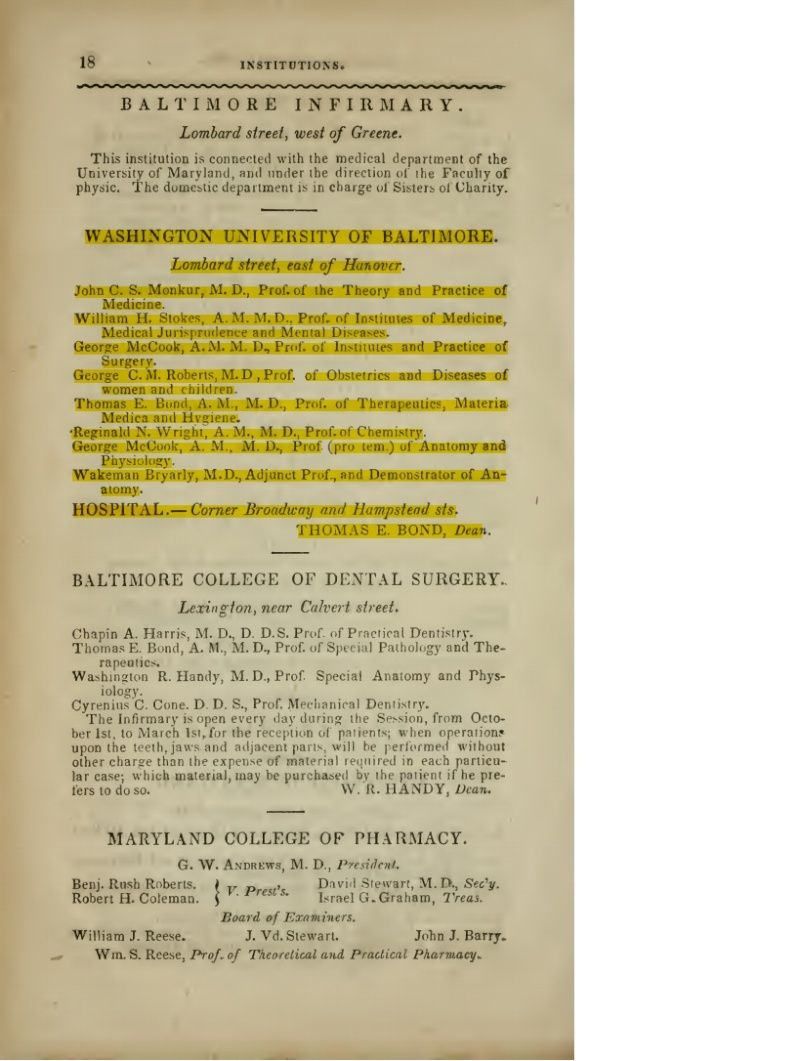
Source: Matchett's Baltimore Directory, page 18
In addition to this, Dr. Moran deposed in his memoranda that a physician named Dr. Thomas D. Baird, the president of the hospital, was responsible for having a monument placed for Poe in Baltimore, but I could find no doctor of that name. That is because the doctor was in fact named Dr. Thomas E. Bond, M.D., also Dean (President) of the above named hospital.
Here are a few pictures of the building where this Hospital for mariners was located (corner of Lombard and Broadway)
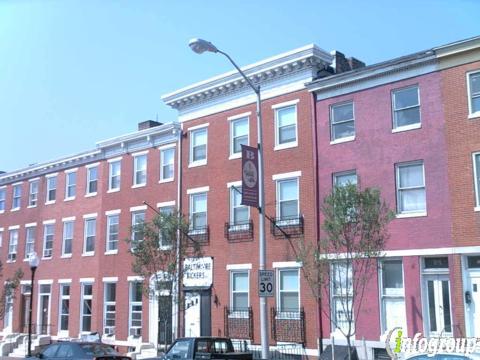
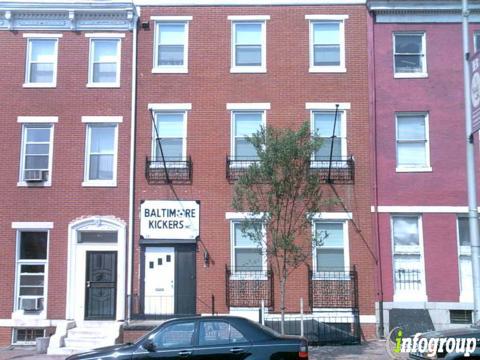
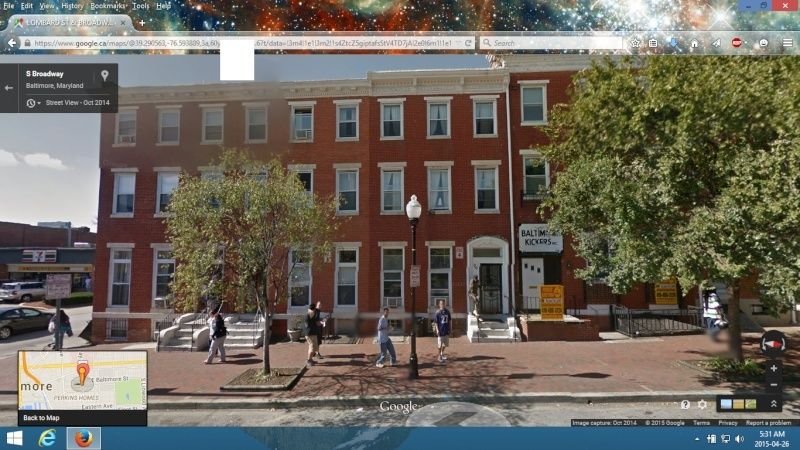

Source: Matchett's Baltimore Directory of 1849, page 410
However, there was another hospital with a very similiar name, located on the corner of Lombard and Broadway, which was connected to the Washington University of Baltimore, and in the following advertisement, you will see that it had special facilities for sailors of the U.S. Navy to come for medical advice or assistance, as per order of the U.S. Navy. This is the correct hospital in which Edgar Allan Poe spent the final days and/or hours of his life. This gives credence to the fact that Dr. S. Reynold was a physician in the U.S. Navy and lived in Hanover Street, which street name you can find in the following:

Source: Matchett's Baltimore Directory of 1842, page 16

Source: Matchett's Baltimore Directory, page 18
In addition to this, Dr. Moran deposed in his memoranda that a physician named Dr. Thomas D. Baird, the president of the hospital, was responsible for having a monument placed for Poe in Baltimore, but I could find no doctor of that name. That is because the doctor was in fact named Dr. Thomas E. Bond, M.D., also Dean (President) of the above named hospital.
Here are a few pictures of the building where this Hospital for mariners was located (corner of Lombard and Broadway)



 Re: The Murder of Edgar Allan Poe
Re: The Murder of Edgar Allan Poe
The names also mentioned in Dr. John J. Moran's memoranda on Poe's last hours was George W. Childs, Hugh Sisson and Mr. Volck, artist. I found these individuals in the Baltimore Directories as well, however the artist was named Mr. Volkmar, and not Volck. George W. Childs was really James Childs of the U.S. Navy.
Hugh Sisson:
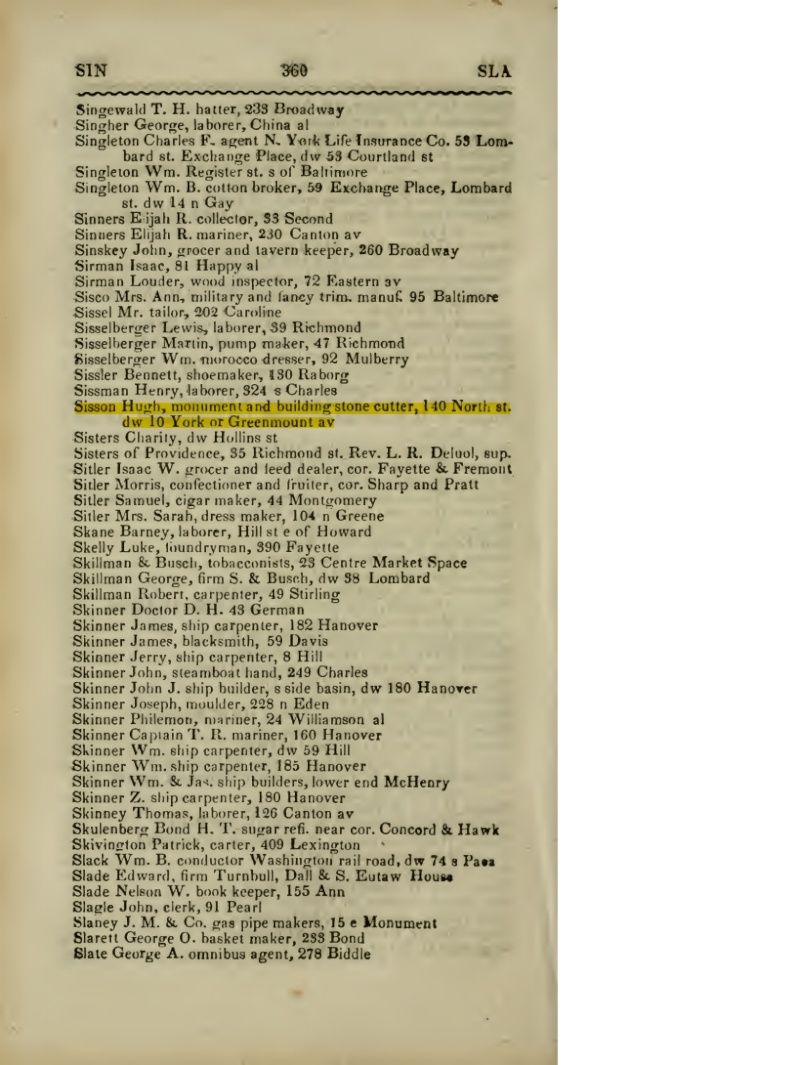
Source: Matchett's Baltimore Directory of 1849, page 360
Charles Volkmar:
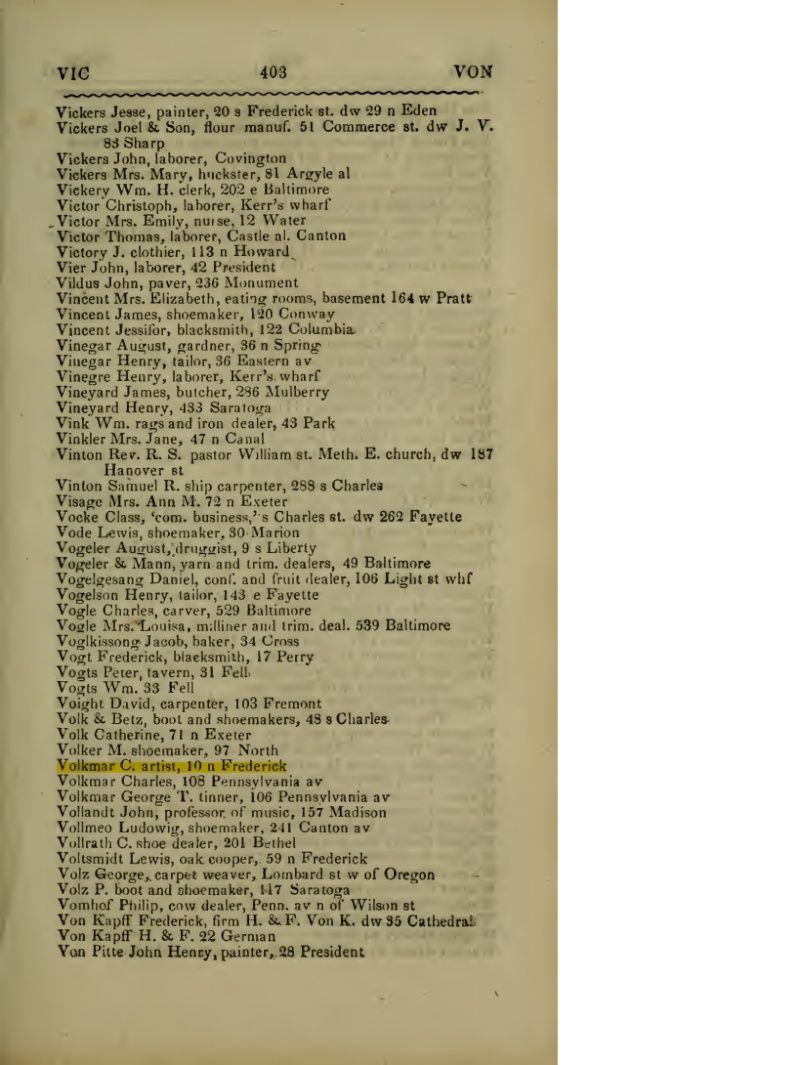
Source: Matchett's Directory of 1849, page 403
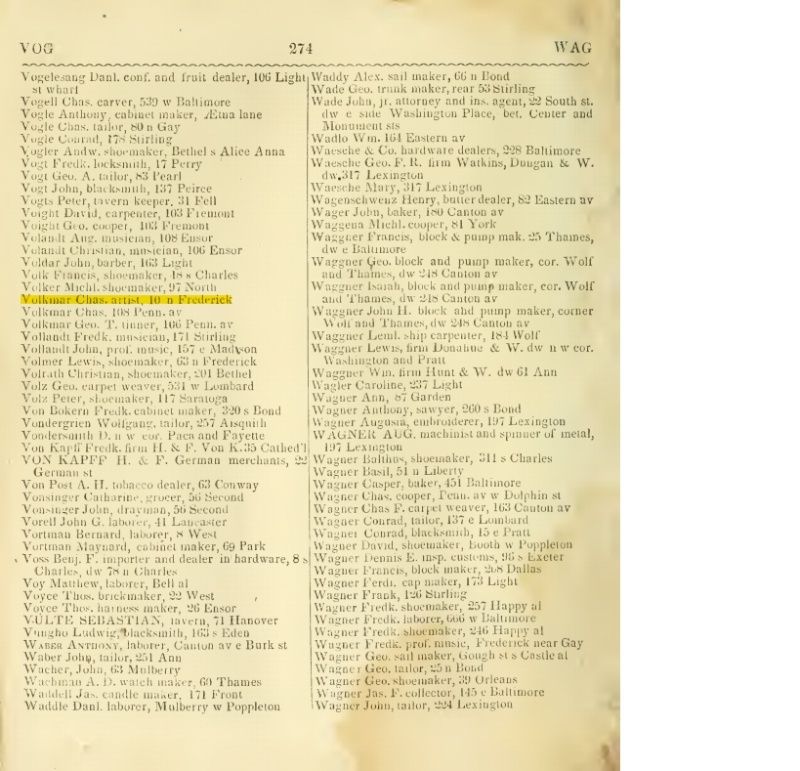
Source: Matchett's Baltimore Directory of 1851, page 274
James Childs:
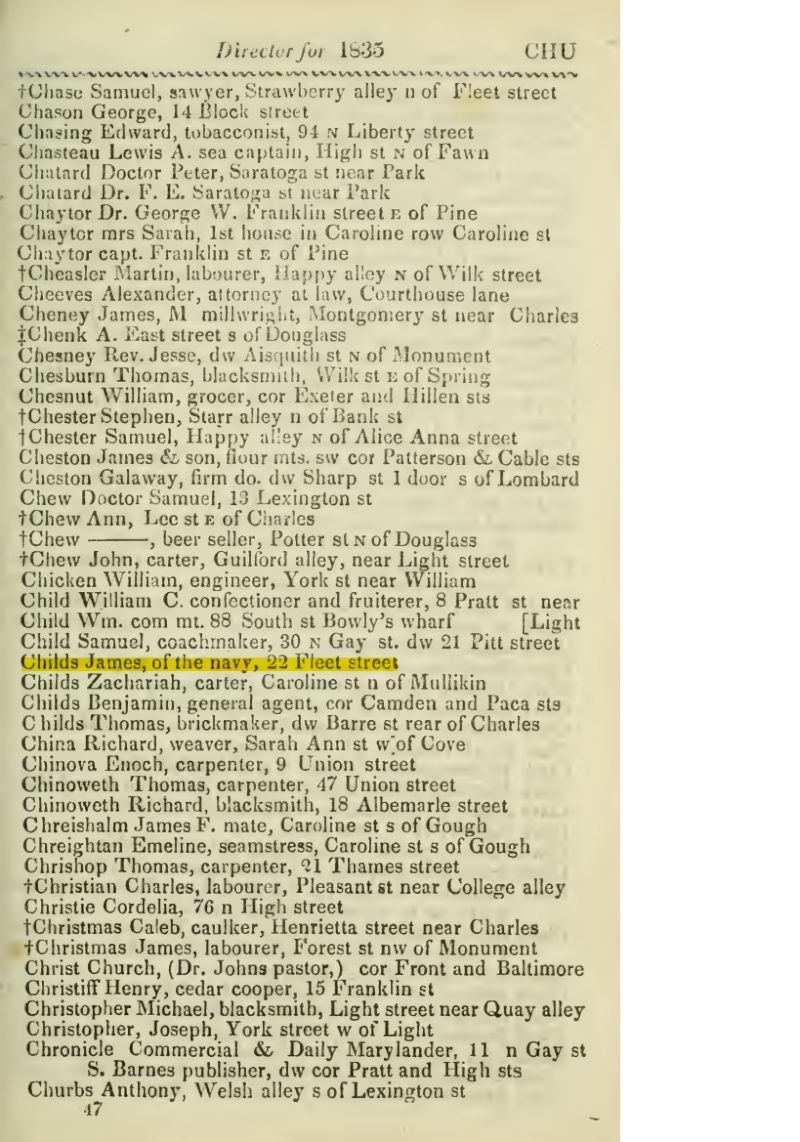
Source: Matchett's Baltimore Directory of 1835, page 47
Hugh Sisson:

Source: Matchett's Baltimore Directory of 1849, page 360
Charles Volkmar:

Source: Matchett's Directory of 1849, page 403

Source: Matchett's Baltimore Directory of 1851, page 274
James Childs:

Source: Matchett's Baltimore Directory of 1835, page 47
 Re: The Murder of Edgar Allan Poe
Re: The Murder of Edgar Allan Poe
Here is another corker of a lie from Dr. John J. Moran - he stated that Dr. Thomas D. Baird, president of the Baltimore City College, was responsible for the idea of the erection of the Poe Monument in Baltimore, however, I could find no Dr. Thomas D. Baird whatsoever. I did find a Thomas D. Baird in the Baltimore Directories, but he was a principal and math teacher of the High School of Baltimore.
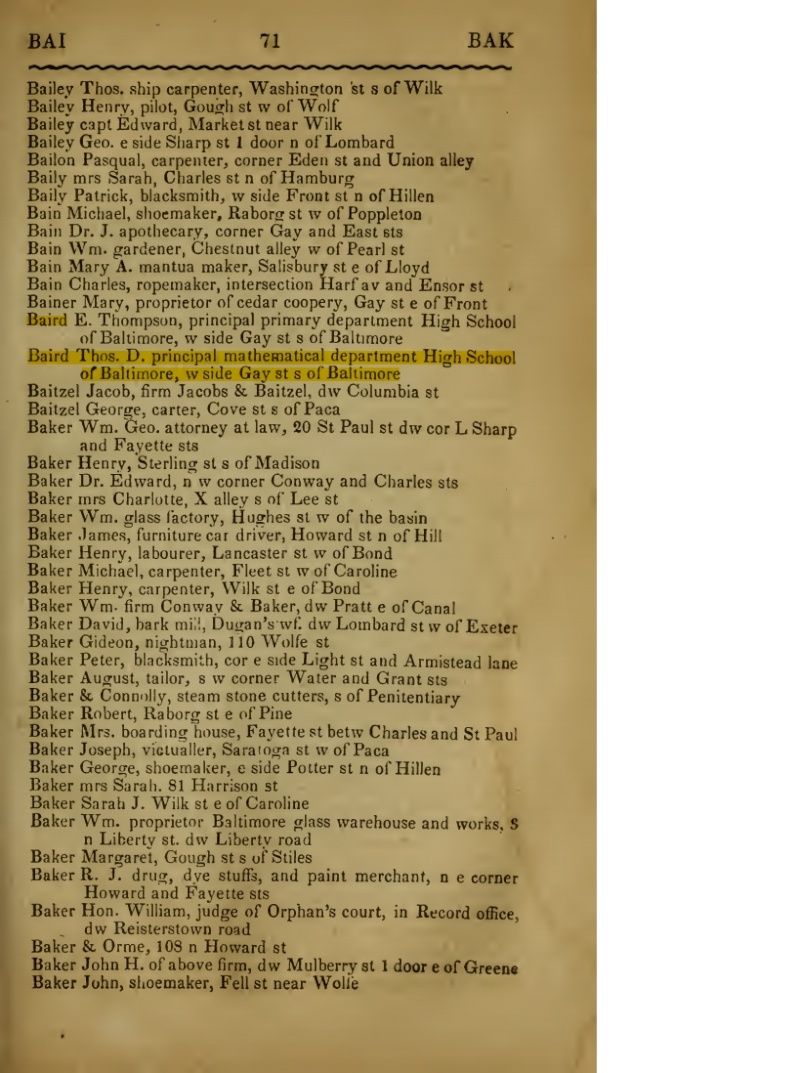
Source: Matchett's Baltimore Directory of 1842, page 71
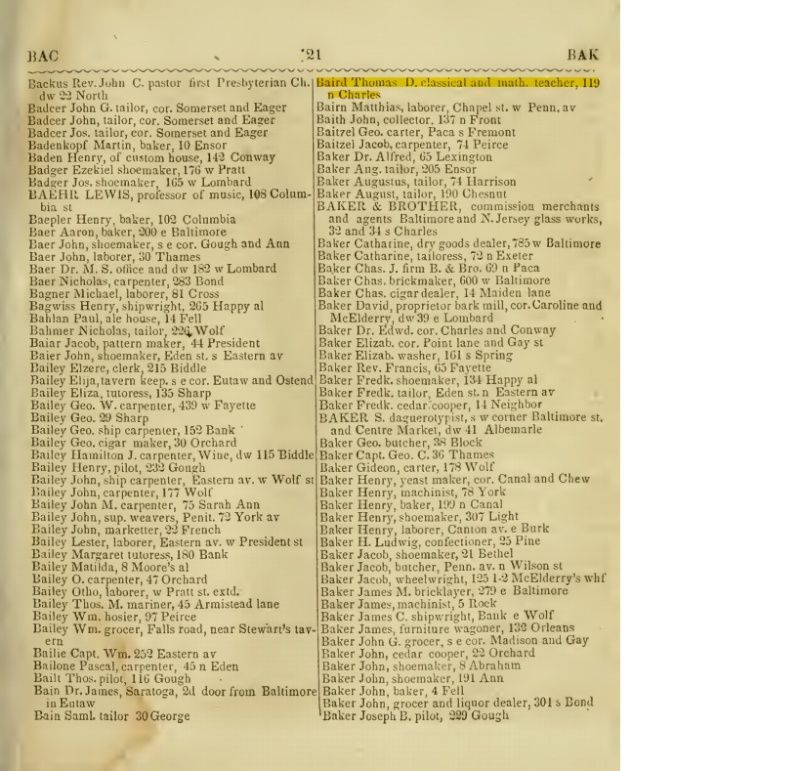
Source: Matchett's Baltimore Directory of 1851, page 21

Source: Matchett's Baltimore Directory of 1842, page 71

Source: Matchett's Baltimore Directory of 1851, page 21
 Re: The Murder of Edgar Allan Poe
Re: The Murder of Edgar Allan Poe
Xtreme Psychology
Reflective Profiling: The William Wilson Effect
Introduction
PRIMACY OF VICTIMOLOGY
REFLECTIVE PROFILING
"LET ME CALL MYSELF, FOR THE PRESENT, WILLIAM WILSON.”
"That is not my real name. That name has already been the cause of the horror – of the anger of my family. Have not the winds carried my name, with my loss of honor, to the ends of the earth? Am I not forever dead to the world? – to its honors, to its flowers, to its golden hopes? And a cloud, heavy and endless – does it not hang forever between my hopes and heaven?...
"Hope! In me you lived — and, in my death — see by this face, which is your own, how wholly, how completely, you have killed — yourself!"
Edgar Allen Poe, The Story of William Wilson
It doesn't matter if you're a victim or a victimizer. In fact, Primacy of Victimology sees a co-relationship between murder victim and killer. It's just like in the Edgar Allen Poe story, William Wilson. He was his own enemy. He was his own victim. Victim and enemy were one. It doesn't happen every time with every victim. Sometimes there is no one-to-one comparison. But there's almost always one victim who gives his or her killer away.
Two scenarios.
Two people kill two people with the same weapon or method. The crime scenes are the same except for the victim.
One victims is a prostitute. One victim is a president.
Are the profiles the same?
M.O. is exactly the same. Same weapon. Same method exactly. Victim's are opposites. One is a president. One is a whore. Her identity is known and she's just a regular typical person in the sex trade, nothing notable about her background. But you can make a distinction as to high class call girl or common street prostitute.
Are the killers inherently different? How are they different? Marginally? Totally? Diametrically? Unknown?
Primacy of Victimology only stands if it stands in the most extremely opposing cases. Else it falls.
Reflective Profiling: The William Wilson Effect
Introduction
Primacy of Victimology and Consciousness Theory
Primacy of Victimology
Victimology (victim type) here is shown to have primacy over modus operandi in developing the foundation of a serial killer profile.
It’s derivative is:
Consciousness Theory*
This is the theory that you are what you think and, what you do, you do unto whom you think about, not just because you have a motive to hurt or benefit them but because you are hurtful or benevolent and they are your primary object of consciousness or close to primary.
You won't find "consciousness theory" in psychology, or in profiling or behavioral science. It's only in Philosophy. The Transcendentalists like Ralph Waldo Emerson. You are what you think. You are what you think about.
*Not to be confused with Theories of Consciousness which are thoughts on the properties of mental self-awareness.
PRIMACY OF VICTIMOLOGY
REFLECTIVE PROFILING
"LET ME CALL MYSELF, FOR THE PRESENT, WILLIAM WILSON.”
"That is not my real name. That name has already been the cause of the horror – of the anger of my family. Have not the winds carried my name, with my loss of honor, to the ends of the earth? Am I not forever dead to the world? – to its honors, to its flowers, to its golden hopes? And a cloud, heavy and endless – does it not hang forever between my hopes and heaven?...
"Hope! In me you lived — and, in my death — see by this face, which is your own, how wholly, how completely, you have killed — yourself!"
Edgar Allen Poe, The Story of William Wilson
It doesn't matter if you're a victim or a victimizer. In fact, Primacy of Victimology sees a co-relationship between murder victim and killer. It's just like in the Edgar Allen Poe story, William Wilson. He was his own enemy. He was his own victim. Victim and enemy were one. It doesn't happen every time with every victim. Sometimes there is no one-to-one comparison. But there's almost always one victim who gives his or her killer away.
Two scenarios.
Two people kill two people with the same weapon or method. The crime scenes are the same except for the victim.
One victims is a prostitute. One victim is a president.
Are the profiles the same?
M.O. is exactly the same. Same weapon. Same method exactly. Victim's are opposites. One is a president. One is a whore. Her identity is known and she's just a regular typical person in the sex trade, nothing notable about her background. But you can make a distinction as to high class call girl or common street prostitute.
Are the killers inherently different? How are they different? Marginally? Totally? Diametrically? Unknown?
Primacy of Victimology only stands if it stands in the most extremely opposing cases. Else it falls.
Guest- Guest
 Re: The Murder of Edgar Allan Poe
Re: The Murder of Edgar Allan Poe
Very good point, but to me a victim is a victim, whether they be a prostitute or a president.
Page 1 of 2 • 1, 2 
 Similar topics
Similar topics» Cry Of Murder
» When Murder Would Not Out
» The Murder of Prince
» The Seventh Murder
» The Greenwich Murder
» When Murder Would Not Out
» The Murder of Prince
» The Seventh Murder
» The Greenwich Murder
Page 1 of 2
Permissions in this forum:
You cannot reply to topics in this forum|
|
|

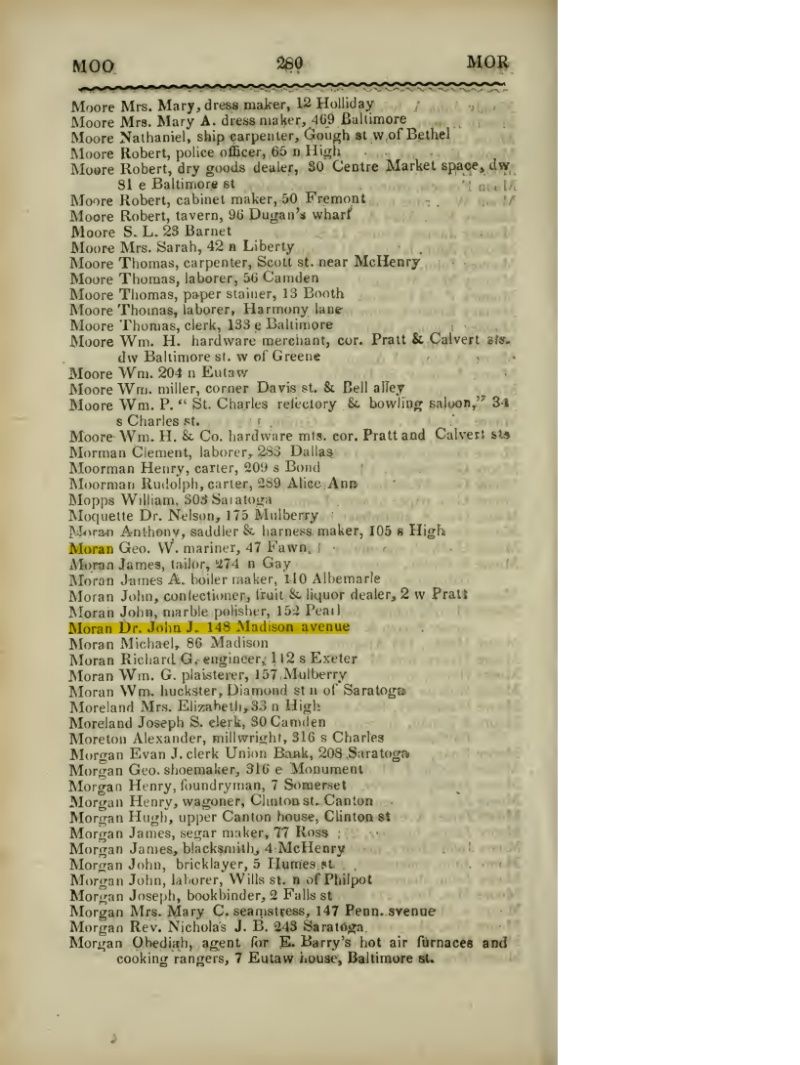
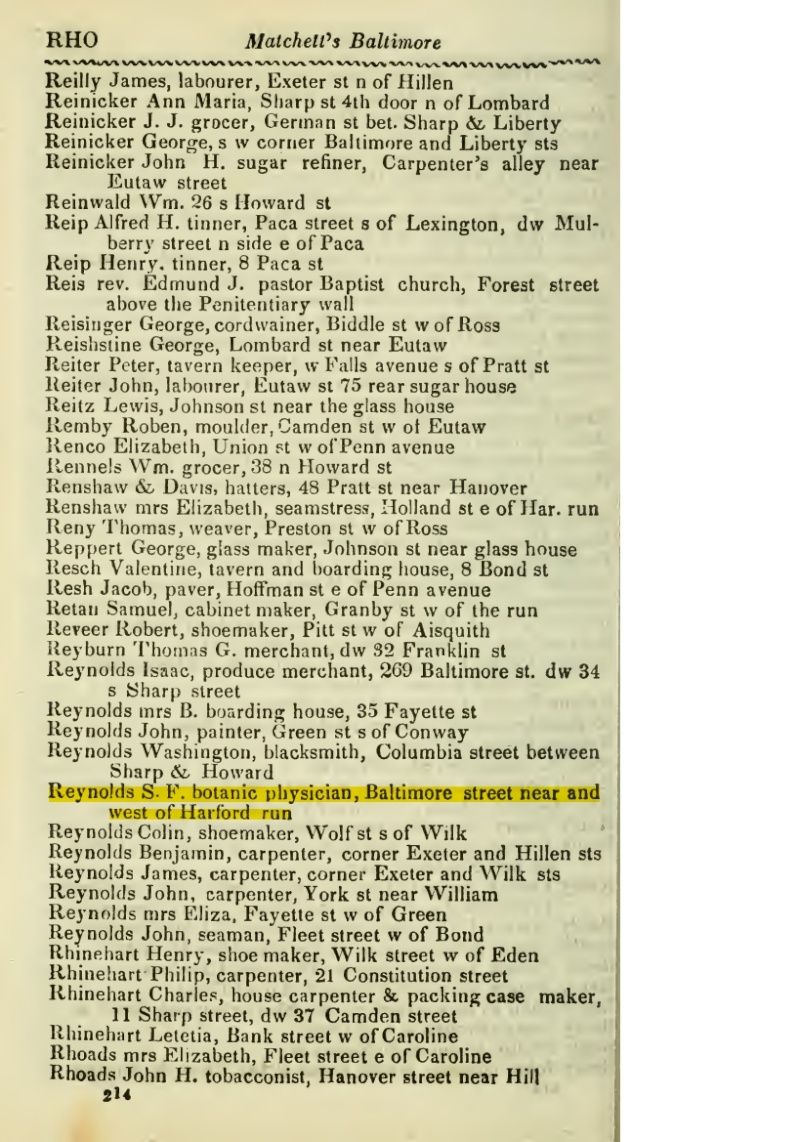
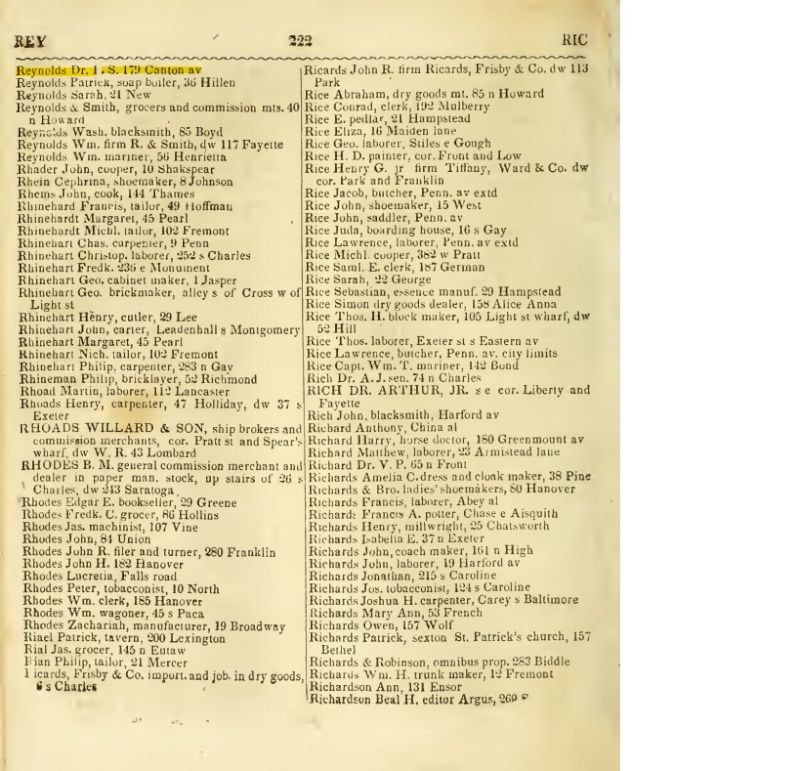
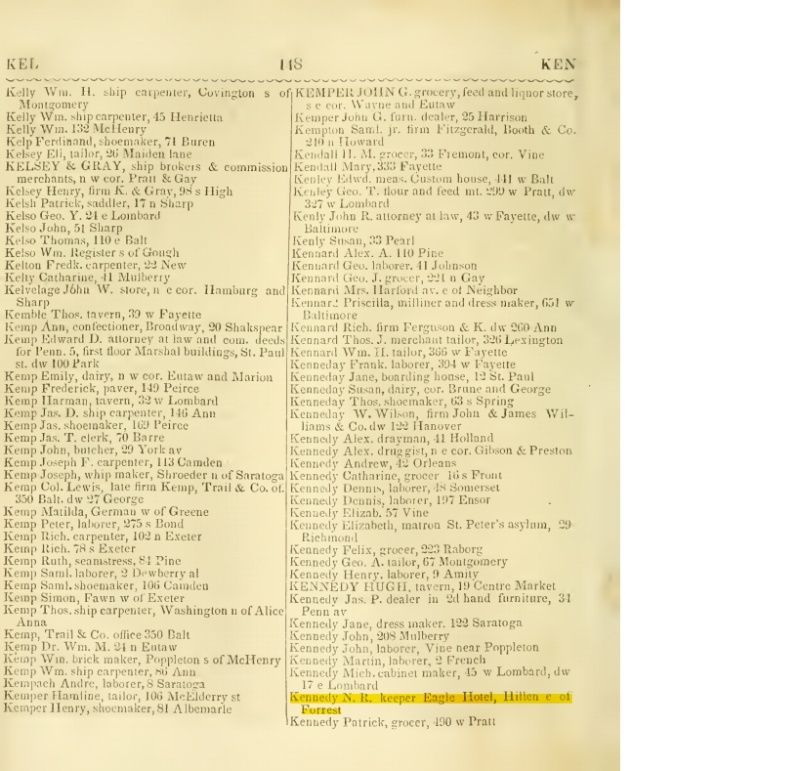
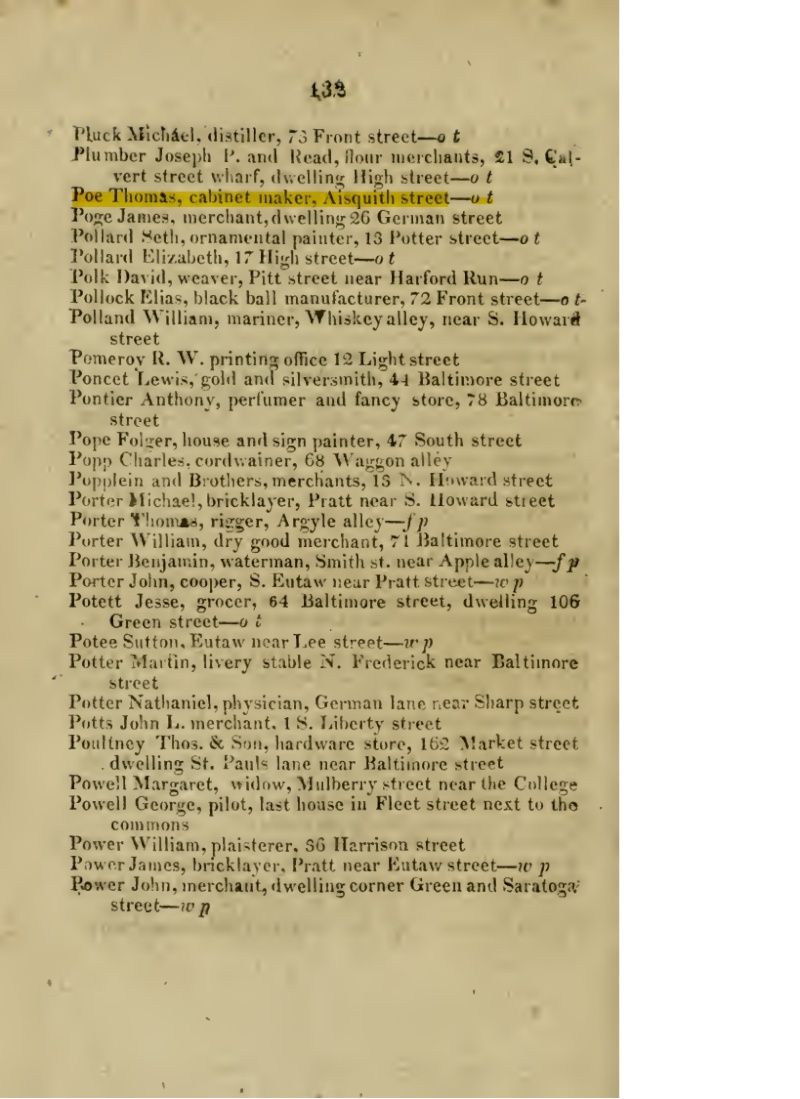

» SK Profile and Indicators
» Primacy of Victimology
» Serial Killer Age Demographics
» Freemasons and Human Anatomy
» Son of Jim and Mary?
» The Maybrick Diary: A New Guide through the Labyrinth
» Doeology v Genealogy
» Given up on George Chapman?
» The Meaning of the Goulston Street Graffiti